

Living on a Yacht: Weighing the Pros and Cons of a Luxury Lifestyle
Explore the dream – and the realities – of Living on a Yacht, offering insights into the freedom and challenges it entails. From financial considerations and space optimization to the impacts of weather and community aspects, it provides a balanced view to help readers make an informed decision about this unique lifestyle.
Imagine the gentle sway of waves, the endless horizon of the sea, and the allure of waking up to a different view every morning. This isn’t a holiday brochure; it’s the possibility of your new life on a yacht. It’s a dream for many, but what does it truly entail? In this exploration, we delve into the reality of yacht living. It’s not all sunsets and sea breezes. Like any home, a yacht has its charms and challenges.
For those in their prime years, considering a shift from a traditional home to a yacht is more than just a change of address. It’s a lifestyle overhaul. We’re not just talking about a snug living space or the need to be a Jack-of-all-trades at sea. It’s about embracing a unique blend of freedom and responsibility.

Our journey through this blog post is not just about painting a rosy picture. It’s about providing a realistic lens through which you can view this significant life decision. We’ll explore how this choice fits into your life puzzle, whether you’re an adventurous soul seeking the thrill of the open seas or a contemplative mind looking for serenity away from the land’s hustle.
As you read through, remember, every big decision comes with its highs and lows–like the tides. Yacht living is no exception. So, let’s set sail on this exploratory voyage to uncover what lies beneath the surface of living on a yacht.
The Allure of Yacht Living
The concept of yacht living taps into a deep-seated desire for freedom, an intimate connection with nature, and a sense of belonging within a unique community. Living on a boat isn’t just about the physical space you inhabit; it’s about the lifestyle and experiences that come with it. From the flexibility to cruise to new locations on a whim to the close-knit marina communities, yacht life offers a distinct way of living that is both challenging and rewarding.The
The Freedom and Flexibility of Location of Luxury Yacht Living
One of the most enticing aspects of living aboard a yacht is the sheer freedom it offers. Imagine having the ability to change your scenery whenever you wish. Whether it’s anchoring in a secluded bay or docking at a vibrant marina, your home is as mobile as you desire. This flexibility allows for a life unbound by the traditional constraints of geographical location.
Sailing from one destination to another, you’re not just moving your home; you’re embracing a lifestyle that allows for spontaneous adventures and experiences. The freedom to explore coastal towns, hidden coves, and open seas is unparalleled. This nomadic way of life provides a sense of liberation and adventure that is hard to find in traditional living arrangements.
Proximity to Nature and Unique Living Experiences
Living on a yacht brings you closer to nature in a way that few other lifestyles can. The rhythm of the waves, the panoramic ocean views, and the ability to witness marine life up close become a part of your daily life. This connection to the natural world is not just visually stunning but also offers a sense of peace and tranquility.

The unique living experiences that come with yacht life are endless. From waking up to the gentle lapping of waves against the hull to enjoying sunsets over the water every evening, these experiences enrich life aboard. Each day presents an opportunity to create unforgettable memories, whether it’s swimming in crystal-clear waters, fishing for your dinner, or simply enjoying the serenity of the sea.
Overview of the Sense of Community in Marinas and Sailing Circles
One might think that living on a boat could be isolating, but the reality is quite the opposite. Yacht marinas and sailing communities are often vibrant and welcoming. When you dock or anchor your yacht, you’re not just stopping at a place; you’re becoming part of a community. These communities are characterized by shared experiences, mutual assistance, and a common passion for the sea.
Life in a marina is rich with social interactions. Fellow liveaboards and sailors form a tight-knit community, often gathering for shared meals, group excursions, or simply exchanging stories and advice. This camaraderie is a significant part of the allure of yacht living. The sense of belonging is palpable, as everyone shares a common understanding of the joys and challenges of life at sea.
The community extends beyond the physical confines of the marina. Sailing circles worldwide are connected by a shared love for cruising and exploration. Whether it’s through organized regattas, informal meet-ups, or online forums, these connections foster a sense of global community. Sailors often form lasting friendships, bound by their shared experiences and adventures at sea.

Marinas often host events and activities that further strengthen these bonds. From educational workshops to social gatherings, there is a sense of collective growth and enjoyment. Living at a marina or being part of a sailing community isn’t just about having a place to dock your boat; it’s about being part of a supportive and engaging network that enriches your life aboard.
If you’re considering taking this step into yacht life, you may want to consider a test run. Charter a private yacht and try this lifestyle out for yourself. You may even decide you prefer renting over buying. Rent one model today, and then — when your mood or plans change — change the yacht for rent. You don’t have to commit right away, this isn’t a marriage, it’s a yacht.
Space and Design: Adapting to Yacht Interiors
Transitioning to live on a boat full-time introduces a unique set of challenges and opportunities, particularly when it comes to space and design. Yacht interiors, whether in a luxury yacht or a modest sailboat, require thoughtful planning and clever solutions to make the most of the available space. This section delves into the art of maximizing space, the crucial role of organization, and the myriad ways you can personalize your floating home.
Maximizing Limited Space: Innovative Design Solutions
The key to successful boat life lies in efficiently utilizing the limited space. Every square inch on a boat counts, and making the most of this space is vital for comfortable living. Design solutions often involve multi-functional furniture, such as beds with storage underneath, foldable tables, or convertible seating areas. These innovations allow for a practical living environment without sacrificing comfort or style.
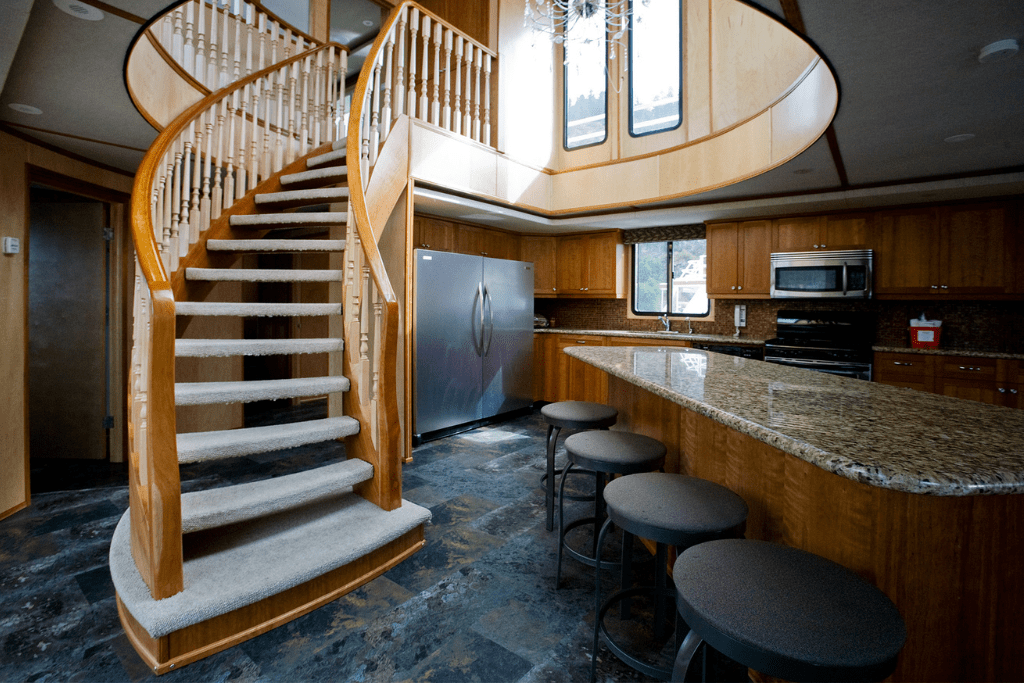
Another aspect is the strategic use of vertical space. Wall-mounted shelves, hanging organizers, and overhead storage can free up valuable floor space. In a sailboat, for example, the interior can be designed with built-in storage in unexpected places like under the stairs or in the hull. This approach ensures that every part of the boat is utilized effectively.
The type of boat also plays a role in how space can be maximized. For instance, catamarans typically offer more living space compared to monohulls, making them a popular choice for those looking to move aboard full-time. Regardless of the boat type, the goal is to create a space that is both functional and comfortable.
The Importance of Efficient Organization When Yachting
Living on a boat full-time demands a high level of organization. The limited space means there’s little room for clutter, making it essential to keep everything in its place. Efficient organization not only makes life on board more comfortable but also ensures safety when the boat is in motion.
Organizational strategies include using containers and baskets to keep items secure, labeling storage areas for easy access, and regularly decluttering to avoid accumulating unnecessary items. This discipline in organization extends to all aspects of boat life, from the kitchen and living areas to personal belongings and maintenance tools.
Boat insurance policies often require certain safety standards to be maintained,
and a well-organized boat is more likely to meet these requirements. Keeping equipment properly stored and accessible can be critical in emergencies. Additionally, an organized interior can help in reducing the overall cost of living on a boat, as it prevents damage and loss of items, which could be costly to replace.
Customization Options for Personalizing Your Space
Turning a yacht into a home involves more than just functional adjustments; it’s about infusing your personality into the space. Customization allows boat dwellers to create an environment that reflects their style and preferences, adding to the enjoyment of luxury yacht living.
Personalizing a yacht interior can range from choosing color schemes and fabrics to selecting artwork and – perhaps – some nautical-themed decorative items . Many boat owners opt for a full tour of customization, tailoring each aspect of the yacht to their liking. This could include custom-built furniture, unique lighting fixtures, or bespoke floorings, such as teak or bamboo.
For those living on a sailboat, customization might mean optimizing the layout for sailing efficiency while also creating a cozy, livable space. This could involve installing custom cabinetry that fits the boat’s contours or adding personal touches like cushions and throws that make the space feel like home.
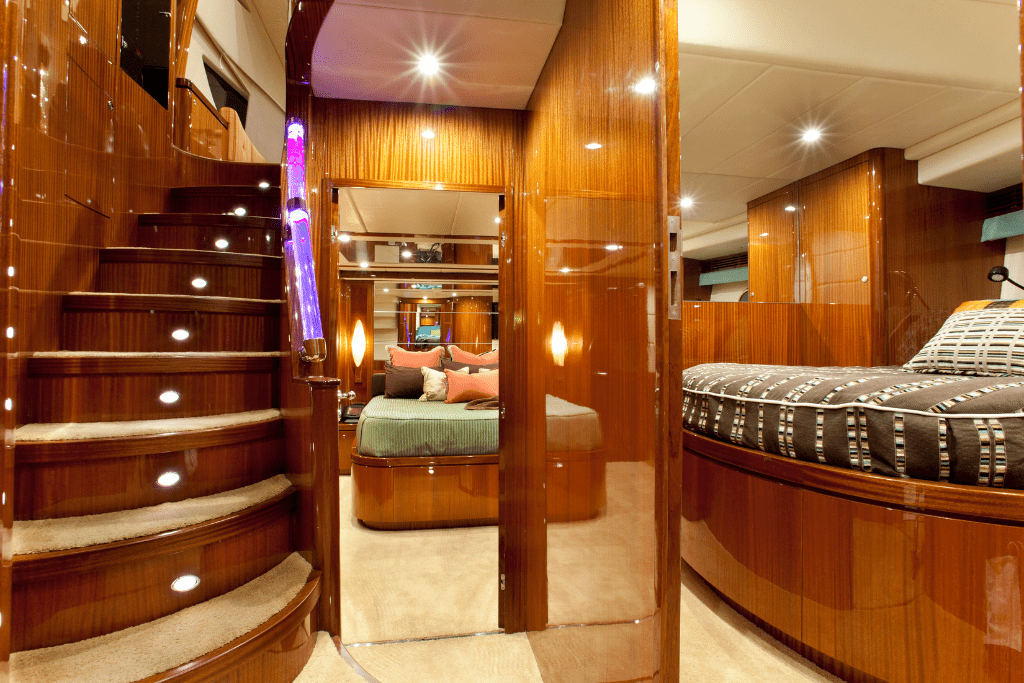
Customization also extends to technological upgrades. Modern yachts can be equipped with advanced navigation systems, entertainment setups, and climate control, enhancing the overall experience of boat life. These modifications not only add comfort but also can increase the boat’s value.
In essence, adapting to yacht interiors is a blend of practicality, organization, and personalization. Whether you’re planning to move aboard a sailboat or a luxury yacht, these elements work in harmony to create a living space that is not just functional but truly feels like home.
Climate Considerations When You Live on a Boat Full-Time
The climatic conditions of the chosen residence place or travel route are not the most obvious factor which must be noted. Being in a city apartment or a private house, we don’t think much about the weather outside the window. If a strong wind blows outside, heavy rain falls or the temperature suddenly drops, we will feel almost nothing.
On a yacht, the weather does not just play an important role, your safety and comfort directly depend on it. Each boat is individual and suitable for certain climatic conditions. It is worth analyzing all the characteristics of the boat in advance and honestly evaluating its capabilities in order to accurately determine whether it is possible to live on a yacht all year round in your chosen water area.
Financial Considerations: The Cost of Yacht Life
Embarking on the journey of yacht life involves more than just adapting to a new way of living; it also requires a clear understanding of the financial implications. While it’s easy to romanticize the idea of sailing around the world or living full-time on a boat, the reality comes with its own set of financial responsibilities. From the initial purchase of the boat to ongoing expenses and the comparison to traditional homeownership, understanding these costs is crucial for anyone considering this lifestyle.
Initial Investment: Purchasing and Outfitting a Yacht
The first step in yacht life is acquiring the right boat. This involves not only finding the best boat that suits your needs but also managing the financial investment it requires. The cost of a new boat can vary widely, depending on factors such as size, brand, and features, some of which we covered above. Choosing to live on a larger boat or a luxury cruiser naturally involves a higher initial investment.
In addition to the purchase price, outfitting a yacht for full-time living is a significant consideration. This may include upgrading boat systems, adding navigation equipment, and customizing the interior to make it livable. Even if you opt for an old, more affordable boat, it could require substantial investment in renovations and upgrades.
Furthermore, acquiring the necessary knowledge and skills for yacht maintenance and sailing is part of the initial investment. This might entail sailing courses, safety training, and learning about the nautical aspects of yacht care.
Ongoing Expenses: Maintenance, Docking Fees, Insurance
Once you own a yacht, the financial commitments continue. Boat maintenance is an ongoing requirement and a crucial part of life aboard. The yacht owners will need knowledge and skills to keep the yacht in good condition. Regular upkeep ensures the safety and longevity of your boat. This includes everything from engine maintenance to hull cleaning and can vary greatly in cost, depending on the age and condition of your boat.
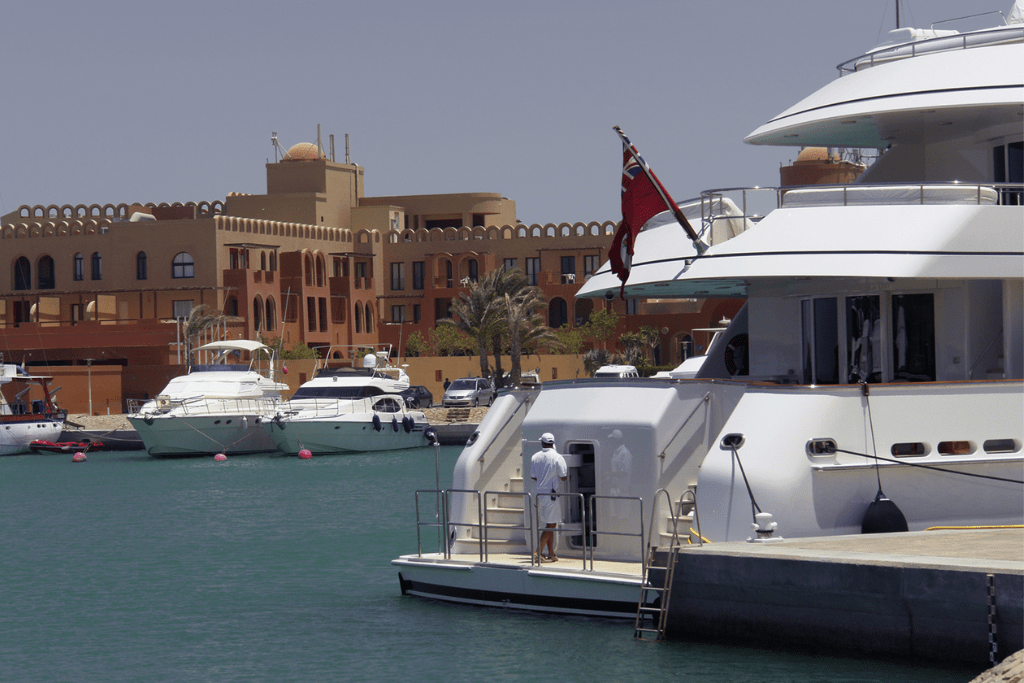
Docking fees are another significant expense, especially if you choose to stay at marinas. The cost can vary based on location and the services offered. Additionally, a dinghy might be necessary for transportation to and from the shore, adding to the expenses.
Insurance is an essential consideration for any boater. Boat insurance policies can be complex and vary greatly in coverage and cost. It’s crucial to have a comprehensive policy that covers potential damages and liabilities, especially when living on a boat full-time.
Comparing the Cost of Living to Traditional Homeownership
When contemplating yacht life, it’s common to wonder if you’ll save money compared to traditional homeownership. The answer depends on various factors, including the type and size of the boat, the chosen lifestyle, and where you plan to dock or anchor.
Annual costs for yacht living can include maintenance, insurance, docking fees, and fuel, which can be comparable to or even exceed the costs of owning a home. However, some expenses, like property taxes and certain utilities, may be lower or non-existent.
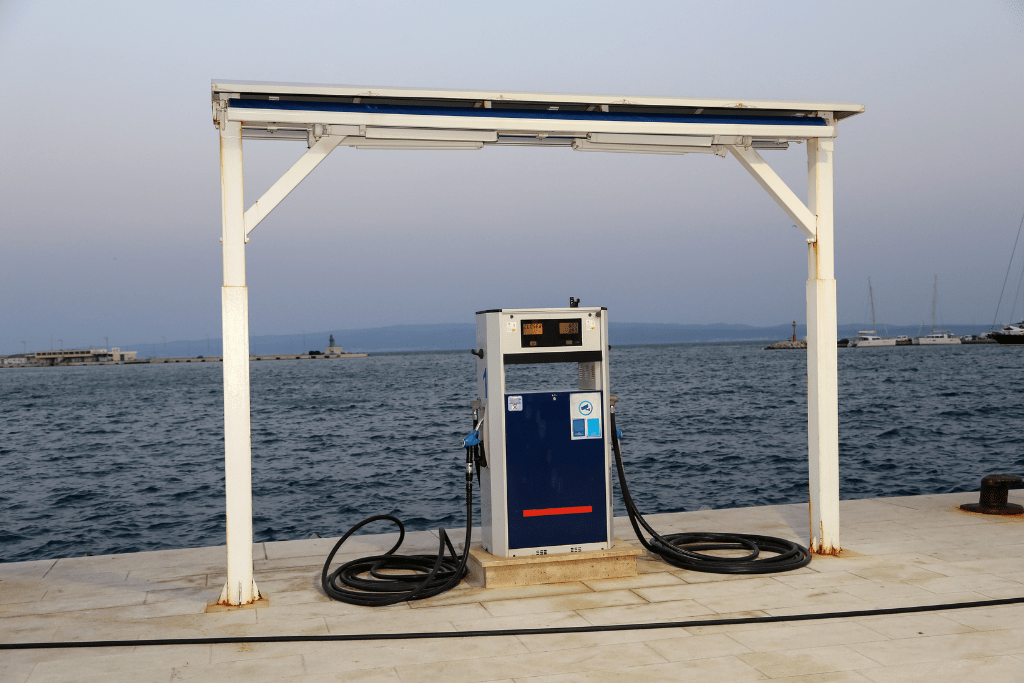
It’s also important to consider the value of the experience and lifestyle when comparing costs. Yacht life offers a unique set of experiences and freedoms that traditional homeownership cannot provide. While the financial aspect is crucial, the decision to live on a yacht often goes beyond mere economics.
Living on a boat full-time can also mean a shift in priorities and lifestyle choices. For some, this means downsizing and simplifying life, which can lead to reduced overall living expenses. However, for others, particularly those choosing a luxury yacht or a larger boat, the costs can be comparable to or even exceed those of a high-end terrestrial home.
Challenges and Downsides of Full-Time Living on a Boat
Living on a yacht presents a unique set of challenges and downsides that are important to consider before making the leap into this lifestyle. While the idea of living on a boat may evoke images of endless sunsets and tranquil waters, the reality can be quite different. Factors such as weather dependency, limited access to facilities, and the psychological impacts of isolation and confined spaces play a significant role in day-to-day life on a yacht.
Weather Dependency and Its Impact
One of the most significant challenges of living on a yacht is the constant need to be mindful of the weather. Your entire life becomes closely tied to weather conditions, which can change rapidly and without warning.
- Safety Concerns : Severe weather can pose serious safety risks. Being caught in a storm while at sea can be dangerous, and even when docked, high winds and waves can cause damage to your yacht.
- Lifestyle Adjustments : Daily activities and travel plans often have to be adjusted according to the weather. This can mean being stuck in a location longer than planned or missing out on certain experiences.
- Constant Vigilance : Living on a yacht requires a high level of awareness and knowledge of weather patterns. This can be mentally taxing, as one always needs to be prepared for the possibility of changing plans or taking emergency precautions.

Remember the old saying, “Red sky at night, sailors delight. Red sky in the morning, sailors take warning!”
Limited Access to Certain Facilities and Services When You Live on a Yacht
Another downside of yacht life is the limited access to facilities and services that are often taken for granted on land.
- Healthcare and Emergency Services : In remote areas, access to healthcare and emergency services can be limited or delayed. This can be a concern for those with medical conditions or in case of accidents.
- Utility Services : Services like high-speed internet, electricity, and plumbing work differently on a yacht and may not always be reliable. This can affect both work and daily living.
- Convenience and Shopping : Getting groceries or finding specific supplies can be challenging, especially when anchored away from urban centers. This requires careful planning and often means you can’t have everything you want when you want it.
Dealing with Isolation and Confined Spaces When Living Aboard a Boat
The psychological aspects of living on a yacht are often overlooked, yet they are crucial for a sustainable life at sea.
- Isolation from Society : While some seek solitude, prolonged periods of isolation can affect mental health. Being away from family, friends, and the wider community can lead to feelings of loneliness.
- Small Living Quarters : The confined space of a boat can be challenging, especially for those used to larger living spaces. It requires adjustments in both physical belongings and mental preparedness for close-quarters living.
- Cabin Fever : Spending extended periods on a boat, especially during bad weather when you can’t leave, can lead to a sense of restlessness or cabin fever. This is where the small space and isolation can compound to impact mental well-being.
While living on a yacht can be an incredibly rewarding experience, it’s important to acknowledge and prepare for the challenges and downsides. Understanding the realities of weather dependency, limited access to amenities, and the psychological effects of isolation and confined spaces is crucial for anyone considering making a boat their home. These factors are integral to life at sea and require careful consideration and planning to ensure a fulfilling and sustainable lifestyle on the water.
Summary and Key Takeaways
Living on a yacht is a dream many aspire to, but it’s essential to approach this lifestyle with a well-informed perspective. This article has journeyed through the various facets of yacht living, weighing both its enchanting appeal and the pragmatic realities.
Recap of the Pros and Cons
- Pros : The freedom to explore new horizons, the intimacy with nature, and the unique sense of community in marinas and sailing circles are among the most compelling benefits. The ability to customize your living space and the adventure that comes with a nautical lifestyle are undeniably attractive.
- Cons : However, these benefits are balanced by challenges such as weather dependency, limited access to facilities and services, and the psychological impacts of living in confined spaces. Financial considerations, including the initial investment and ongoing maintenance costs, are significant.
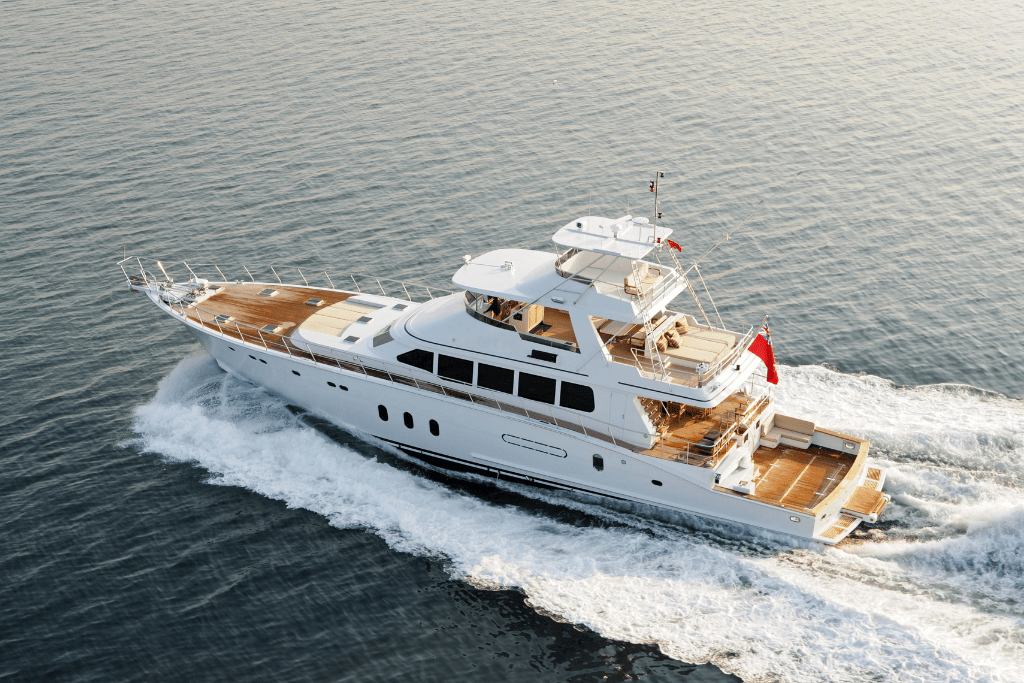
Making a Well-Informed Decision
Deciding to live on a yacht should not be made lightly. It’s a decision that requires thorough consideration of both the financial implications and the lifestyle changes. Prospective yacht dwellers should research extensively, speak with experienced individuals, and realistically assess their readiness for such a commitment.
Final Reflections on Embracing the Yacht Lifestyle
For those who find the allure irresistible, yacht living can be incredibly rewarding. It offers a unique way of life that blends adventure with simplicity, freedom with responsibility. If approached with careful planning and realistic expectations, living on a yacht can provide an enriching and fulfilling experience.
Please note that the information provided in this article is for informational purposes only and should not be considered professional advice. Prospective yacht owners are encouraged to consult with qualified professionals for specific advice related to legal, financial, and practical aspects of living on a yacht.
Leave a Comment Cancel Reply
Your email address will not be published. Required fields are marked *
Please Note: Due to the ongoing impact of Covid-19, orders are taking longer than normal to ship. Please allow 4-6 weeks for delivery on most items. Dismiss
Disappointing photos show what owning a yacht is like in real life
Affiliate links for the products on this page are from partners that compensate us and terms apply to offers listed (see our advertiser disclosure with our list of partners for more details). However, our opinions are our own. See how we rate products and services to help you make smart decisions with your money.
- Owning a yacht certainly sounds like a dream come true. And if you have a nice chunk of change burning a hole in your pocket, you might want to make that dream a reality.
- But you should know first that there are several hidden expenses , headaches, and disappointments that come with yacht ownership.
- As Business Insider's Hillary Hoffower writes , "really, yachts are just floating money." Here's what you're really in store for if you buy one.

Picture it: It's a beautiful summer day and you're laying out in the sun, a cold drink by your side, your favorite music playing softly in the background, and you're slightly rocking to the motion of the waves.
Someone comes to refill your ice bucket and tells you lunch is almost ready.
That's the dream, isn't it? Spending the weekend on a yacht of your very own. Cruising around the Mediterranean just because you can.
But hold on a minute.
Before you get there — you know, to all the relaxation — there's a lot that needs to happen first, like actually buying the yacht, hiring the staff, making sure everything is being cleaned and fixed when necessary, and being prepared for a lot less isolation than you've been imagining.
So as you contemplate buying yourself a yacht , keep in mind that it's not always the dream it's cracked up to be.
Owning a yacht and living the yachting lifestyle may be a dream of yours.
Whether you want to cruise around the Mediterranean or sail up and down the east coast of the US, you might think the best way to spend any time off would be on your own boat.
If you're not up for creating your own custom yacht, you can go to a boat show and tour a bunch until you find the perfect one.
If you go the shopping route, there's a ton of work to be done before you set sail.
You'll likely have to gut the ship if you're getting an older model.
And you'll certainly need to give it a fresh paint job.
Hiring crew members is a must, and experts recommend one per passenger. Captains cost roughly $1,000 per year per foot of boat, which adds up to $110,000 for a 100-foot yacht.
Source: Forbes
Especially if you don't want to learn to care for the boat yourself.
If the crew is on-hand just on days when you're out on the water, you'll have to spend some time cleaning the deck yourself.
If you want to walk around barefoot all the time, you have to keep those floorboards clean.
Since the great outdoors is ever unpredictable, you should always be prepared for a hurricane or any type of extreme weather.
If you're not, and the boat needs to go in for repairs, it will likely end up sitting in line for a while waiting to be fixed.
If you're investing in a sleeper, you may be envisioning a glorious master bedroom.
But you might have small, dark sleeping quarters.
Dreaming of a sun-soaked, sparkling kitchen with an ocean view?
Sorry. Chances are it will lack natural light and tons of counter space.
And the whole area will have more of an open floor plan design.
Hopefully you'll be laying on a chaise with a drink in your hand getting that perfect vacation glow.
But if you're not so lucky with the weather, you'll be spending most of your time indoors.
Ideally, your indoor space will look something like this.
Or even this.
And you're probably picturing an indoor happy hour as nothing short of fluffy white couches and Champagne on ice.
Realistically your interior will probably look more like this.
You'll also want to redo the interior every few years to stay aesthetically relevant, of course.
Because even if you don't mind an outdated style, you'll want it to appeal to visitors and people who want to charter your boat for the weekend.
And all the business associates you bring aboard the SS Whateveryoucallit for meetings.
We can't stress it enough, the upkeep is a beast unto itself.
Exteriors get rusty and corroded ...
... and don't forget about all of the appliances and motors in the interior.
You probably have visions of peacefully enjoying one of the most beautiful sights on your private European cruise.
Chances are, you won't be out there alone.
Thinking of enjoying a quiet night docked in the marina?
Think again! You probably won't be the only ones at the dock, and you'll definitely be able to hear the parties going on three, four, or five yachts down.
Throwing a yacht party of your own could be fun, though.
Except you may be competing with the boat next door.
Oh, and good luck getting your nighttime guests to go barefoot.
Throwing your anchor down and going for a swim is a huge part of why people want to be on the water.
But what happens when you're sailing on a colder — or dirtier — body of water?
Well, that's what the on-board pool is for.
But if you've ever had to take care of an at-home pool, you know it can quickly turn into both a time and a money suck.
You'll want to stock some water toys on board for the days when it's actually nice enough to jump ship.
You can entertain guests with jet skis ...
... kayaks ...
... bodyboards ...
... stand-up paddleboards ...
... and floats for just hanging out in the water.
But, naturally, that means you'll need somewhere to store it all. Good luck finding the space.
Unfortunately you won't always be able to walk onto — or off of — your yacht from the dock.
So you'll need to make sure you have a ship's tender when it's time to head back toward dry land.
If you're someone who wants to spend time on a yacht, but you don't want the hassle, you might want to consider chartering a boat on the weekends.
You could have your friends or extended family pitch in and spend some quality time together on the water.
- Main content

The Ultimate Guide to Embracing the Luxury Yacht Lifestyle
Have you ever dreamt of cruising the azure waters in your very own luxury yacht, feeling the breeze, and experiencing the epitome of freedom and exclusivity? Welcome to the world of luxury yachting, a realm where opulence meets the ocean. Yachting isn’t just about owning a boat; it’s a lifestyle choice that offers unparalleled adventure, privacy, and luxury.
What Defines a Luxury Yacht?
A luxury yacht is more than just a large boat. It’s a floating mansion equipped with the finest amenities imaginable – think gourmet kitchens, plush staterooms, state-of-the-art entertainment systems, and even onboard swimming pools. But it’s not just the amenities that define them; it’s also the impeccable service and the ability to explore secluded destinations that are inaccessible to most.
The Allure of Yacht Ownership
Owning a yacht offers a unique sense of freedom and exclusivity. It’s about exploring the world on your terms, hosting lavish parties on the open sea, or finding solace in secluded bays. The allure lies in the bespoke experiences and the memories created aboard, which are unparalleled by any land-based luxury.
Understanding Yacht Prices
The world of luxury yachts is as varied in price as it is in style and function. But what factors into the cost of owning one of these majestic vessels?
Factors Influencing Yacht Prices
Several factors influence the price of a luxury yacht, including size, brand, customization options, and the level of luxury and technology onboard. Materials used in construction, the pedigree of the yacht builder, and even the yacht’s history can also affect its price.
How Much Does a 200-Foot Luxury Yacht Cost?
A 200-foot luxury yacht is the epitome of opulence on water, often equipped with amenities like helipads, spas, and movie theaters. Prices for such a vessel start in the tens of millions and can reach up to hundreds of millions, depending on customization and features.
How to Buy a Luxury Yacht
Buying a luxury yacht is an exciting yet complex process. It’s not just a purchase; it’s an investment in a lifestyle.
Steps to Buying Your Dream Yacht
- Define Your Needs : Consider how you plan to use the yacht – for leisure, entertaining, or exploration.
- Budget : Beyond the purchase price, factor in maintenance, crew, and operational costs.
- Research : Explore different types and brands to find the perfect match.
- Inspection : Always conduct a thorough inspection and consider a sea trial.
- Closing the Deal : Work with a reputable broker and ensure all legal and financial aspects are in order.
Financing Your Yacht Purchase
Financing a luxury yacht can involve loans, leasing, or other financial arrangements. It’s crucial to work with financial institutions familiar with the yachting industry to get the best terms.
Types of Luxury Yachts
From sleek power boats to majestic super mega yachts, the choice is vast.
Luxury Power Boats vs. Super Mega Luxury Yachts
Luxury power boats are ideal for those looking for speed and agility, while super mega yachts offer the ultimate in luxury and space, often accommodating 20 or more guests along with a large crew.
Finding the Right Type for Your Needs
Your lifestyle and preferences will dictate the best type of yacht. Whether it’s intimate sunset cruises or grand ocean voyages, there’s a yacht to suit every dream.
Where to Find a Private Yacht for Sale
The journey to finding your perfect yacht starts with knowing where to look.
Top Yacht Brokers and Dealerships
Working with a reputable broker or dealership can simplify the process, offering access to an extensive network of listings and valuable market insights.
Online Platforms for Yacht Sales
Several online platforms specialize in yacht sales, providing detailed listings and virtual tours to help narrow down your choices.
Maintenance and Upkeep of a Luxury Yacht
Owning a luxury yacht comes with its set of responsibilities, primarily maintenance and upkeep to ensure it remains in pristine condition.
Yearly Maintenance Costs
The cost of maintaining a luxury yacht can be substantial, often totaling 10% of the yacht’s value annually. This covers everything from mechanical maintenance to crew salaries.
Tips for Yacht Maintenance
Regular maintenance is key. This includes routine checks, cleaning, and servicing of all mechanical and electronic systems to prevent issues and ensure safety and reliability.
Embarking on the journey to buy a luxury yacht is the beginning of an exciting adventure. With the right preparation, research, and advice, you can find the perfect vessel that offers not just a mode of transportation, but a whole new way of experiencing the world. Whether it’s for the thrill of the open sea, the luxury of onboard amenities, or the joy of secluded getaways, a luxury yacht can bring your dreams to life in unparalleled style.
- What is the starting price for a luxury yacht? The starting price can vary widely, beginning at several hundred thousand dollars and reaching into the millions for larger, more luxurious models.
- How do I choose the right yacht? Consider your lifestyle, needs, and preferences. Think about size, type, amenities, and the kind of experiences you wish to have.
- Can I charter a yacht before buying? Yes, chartering a yacht can provide valuable insight into the type of yacht that best suits your needs and preferences.
- What are the ongoing costs of owning a yacht? Beyond the purchase price, expect to pay for maintenance, crew salaries, fuel, insurance, and docking fees.
- Is it better to buy a new or used yacht? Both options have their advantages. New yachts offer the latest technology and customization, while used yachts can offer value and history but may require more upkeep.
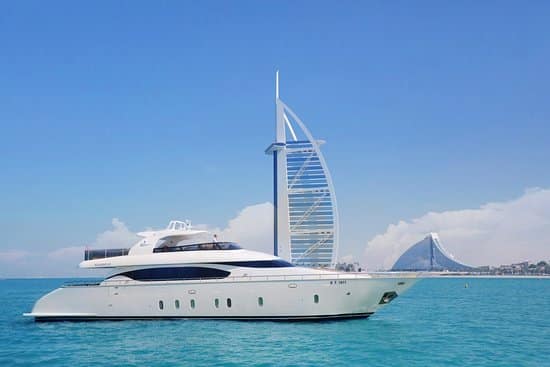
Seven Questions to Ask Before Choosing A Luxury Yacht for Your Party
Have a party soon? Tourists from all over the world flock to Dubai, making it a popular destination. If you're…

Seabob Rental Dubai: Dive into Adventure with Dubriani
Introduction Welcome to Dubriani, your premier destination for luxury yacht charters and thrilling water adventures in Dubai. Today, we’re diving…

Experience Luxury on the Water: Yacht Charter and E-Foiling in Dubai
Dubai is known for its luxurious lifestyle and breathtaking scenery, and what better way to experience both than by chartering…
Connect Via Whatsapp
Remember Me
Form Contact
Book with Whatsapp
Living on a Boat: Beginner's Guide for Liveaboards

It’s easy to romanticize the idea of living on a boat full-time; however, it's an alternative lifestyle like that takes preparation, organization and an ability to roll with changes. When you commit to moving aboard, make checklists of necessities and talk to your partner about deal-breakers. Prepare the boat for life aboard well before you make the move.
Factors to Consider Before Living Aboard
Before moving onboard your boat, you should ask yourself some questions:
- Is this just for a period of time before you go cruising or is this a lifestyle choice?
- Are you comfortable with repeatedly defending your choice to your friends and family?
- Are you living in a climate that is boat-friendly year-round?
- Are you handy and a good problem solver?
- Who will accept your Amazon deliveries and are you ready to grocery shop frequently since there won’t be room to stow much?
- Are you ready to become your own maid?
- Will you feel comfortable with your kids being in this new environment?
- What’s Plan B if it doesn’t work?
After moving aboard, you may be hauling the laundry to the laundromat or groceries from the parking lot with no dock cart nearby. You’ll need to go to the pump-out station regularly as well as to the post office for your mail. Small doesn’t translate to easy so mentally run through a typical week and write down solutions to the issues.
Essentials: Stowage, Comfort & Connectivity
When you move from a 2,000-square foot house to a 40-foot boat, all the closets are smaller, the cupboards are fewer and there’s no two-car garage. In preparation, you’ll need to de-clutter kitchen gadgets, tools, mementos and clothing. Keep winter clothes in off-boat storage and your business attire at the office if possible.
Make sure the boat is warm and dry with plenty of ventilation. Mildew and condensation will become a part of life and you’ll need a whole new set of cleaners and tools.
Plan your connectivity needs. Whether a dish for TV or high-speed internet access via the marina WiFi, you’ll need a connectivity solution so you’re not cut off from work, friends, family and entertainment.
Beneficial Skills to Have for Living Onboard
Maintenance on a boat may be worse than in a house in terms of frequency and specificity. Basic plumbing, electrical and mechanical skills will be needed because boat systems are generally less reliable than their household counterparts. The alternative is calling a contractor for every issue.
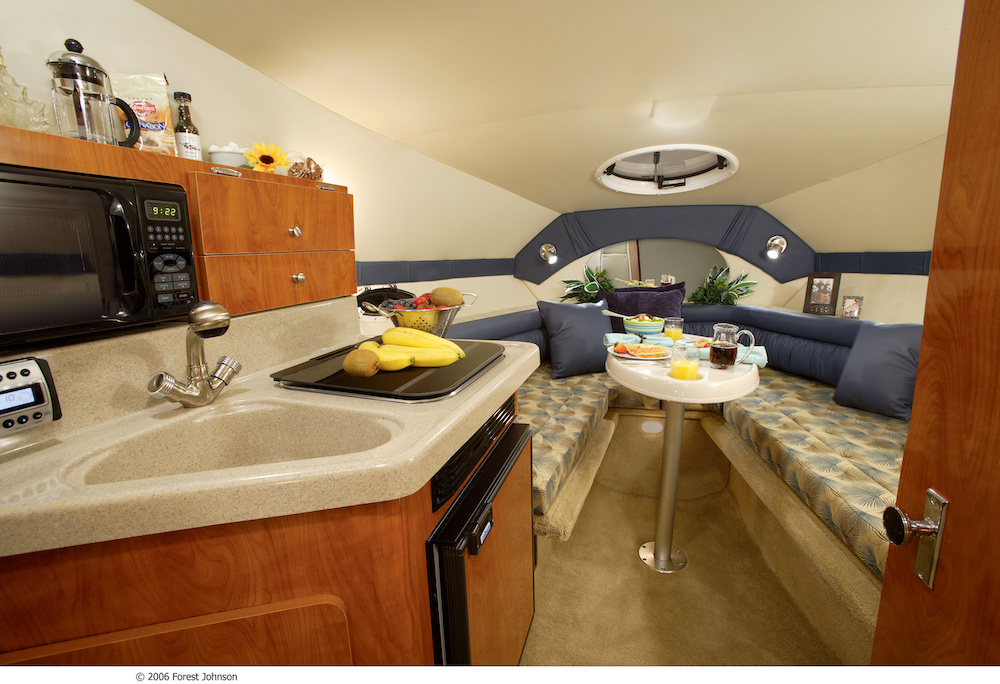
Cost of Living on a Boat
Don’t assume that you’ll save money by moving aboard. Here's some expenses you may incur by living on your boat:
- Boat mortgage payment
- Boat insurance
- Waste management
- Food and water
The best way to manage expenses is by making a budget and sticking to it. Depending on the size and value of the vessel, boat insurance may be just as expensive as house insurance. Property taxes will usually be less as will electricity since you’ll not be heating/cooling/lighting as big a space. You’ll probably save money on waste management, gas and water as well.
Where costs rise dramatically is maintenance . Marine parts and labor are usually more expensive—sometimes 20% more, than typical household counterparts. If you take on the tasks yourself and you’re self-employed, every hour you spend working on your boat is an hour you don’t make money.
Learn More in our Boat Insurance Guide
Safety & Security
You’ll need to decide whether to invite strangers inside, and if kids and pets will be safe around the docks. Install CO2 and smoke alarms and a propane sniffer, check the fire extinguishers periodically, and keep an eye on the basics like bilge and battery levels. You may also want to consider the following:
- Will you be safe walking from the parking lot to the slip at night?
- Will your nice car be okay outside the garage 24/7?
- Who will call you if your boat starts to list when you’re on vacation?
There aren’t really more or fewer safety issues, just different kinds.
Daily Life & Socialization
Socializing is easier in a marina than in a neighborhood. Neighbors help neighbors in marinas but it’s a two-way street so be ready to lend a hand when needed. If you’d rather live anonymously, consider an end tie in the forgotten corner of the marina. Although there are challenges to living on a boat, if you’re prepared, you may find it a perfect fit.
I already have a boat in a slip in a marina, so can I just move aboard?
Most marinas require an application for you to move aboard permanently. In some areas, liveaboards aren’t permitted or there are long waiting lists. Liveaboard slip fees are usually higher and your insurance rates may increase if your boat becomes your primary residence.
How do I live aboard a boat with a pet?
Dogs, cats and other pets need to acclimate to their new environments. They need exercise, private space and easy access to food and a potty. Make sure stairs and docks are safe for them and that they know how to get on the boat or dock if they fall in the water. Be careful of small spaces where they can get trapped and wires they can chew. Teach them about their new environment and be patient.
Learn more in Boating with Pets and Tips for Taking Your Dog Boating .
Read Next: Boat Owner's Guide
Looking for more information on boat ownership? Read...
- Boat Owner's Guide
- Costs of Boat Ownership
- Boat Maintenance Guide
- Insuring Your Boat
- Boat Safety Guide

Join Our Newsletter!
Get community news, buying bargains, and how-to guides at your fingertips.
- Bottom Painting & Prop Speed
- Fiberglass & Paint Work
- Running Gear & Valves
- Full-Service Team
- Monthly Maintenance Programs
- Dockside Service Team
- Full-Service Boatyard
- Management Services
- Accounting & Reporting
- Relevant Management Experience
- News and Media
Living on a Yacht: Pros and Cons
Like almost everything about yacht life, living on board is amazing, but you’ll probably find a reason to complain a little, too. It’s one of the best first world problems to have. However, the truth is that living on a boat is not for everyone.
Living on a yacht is a big lifestyle change, and there is no denying that. Yacht Management shares the pros and cons of this type of living.

Home is Where You Lay Your Head: Living on a yacht is your ticket to see the world, and if you aren’t planning on travelling from port to port, then you’re missing out on an opportunity of a lifetime. You are free to travel the world! Sailing La Vagabonde is a great YouTube channel that documents the experiences of a couple traveling the world on their sailboat La Vagabonde. The Cost of Living: The highest cost of living on a yacht is the mooring and the maintenance. After that, you’ll be saving money on water, electricity, and mortgage or rent. The cost of living on a yacht will also significantly decrease your cost of life in other, indirect ways too. Because space is so important, you will have less tolerance for accumulating clutter, and you’re likely to spend less money. You’ll also waste less food on board, choosing rather to cook and eat everything you bring aboard because again, less space means you pay more attention to what you buy. Nothing Will Be the Same: There is truly no other living situation that comes even close to achieving the same level of solitude, freedom, and sense of self sufficiency that you experience living on a yacht. Once you’ve lived on a yacht, you have truly done something amazing that not many people have ever had the privilege of experiencing.
Errands: When living on your boat , leaving the comfort of your water home to run errands is a challenge all on its own. Groceries: Carrying groceries from the car to the house is not too bad, even for those of us who like to grab every bag in the trunk and painfully crab walk to the front door. Trying to do the same from the parking lot, down the steps on to the dock, across the swaying waters, and up onto the deck of your yacht is a great challenge. Laundry: Carrying laundry from the yacht to the car and vice versa has the same set of challenges as the groceries we mentioned before. Unless you have a washing machine on board, laundry can get difficult at times. No Sleep on Stormy Nights: If you ask almost anyone if they like sleeping when it’s raining, chances are they’ll say yes. There’s just something about sitting cozy in a sturdy house while the heavens stir around you. Not in a boat, no sir. When the sea is upset, you’ll know, and you won’t get much sleep because of it. Large yachts tend to rock less, and with the right kind of mooring you can avoid some sleepless nights, but when it’s storming out, chances are you’ll have a tough time sleeping.

For all inquiries, fill out the form below and a member of our team will respond as soon as possible
- Skip to primary navigation
- Skip to main content
- Skip to primary sidebar
- Skip to footer
Yacht Cruising Lifestyle
Everything fun you can do from your yacht
Living on a Boat – Is It Worth The Reward?
August 23, 2021 by Travis Turgeon 4 Comments
When we think of living on a boat, it’s easy to imagine a glamorous lifestyle that encompasses everything from high-end champagne to catered meals with family and friends. While this standard of living is certainly possible, living on a boat is an alternative lifestyle that many make day-to-day sacrifices to fulfill. Making a home out of a boat takes a high level of planning, preparation, and commitment. Below, we outline the primary considerations for those making the transition to boat life.
What Should I Consider Before Living on a Boat?
Before diving into the planning and preparation process for transitioning to life on a boat, you’ll need to carefully consider just how the lifestyle can work in your favor. Start by asking yourself some basic questions that will directly impact how you’ll begin the process.
- Is moving to a boat part of a lifestyle design, or will it be a temporary solution to long-term goals such as full-time cruising?
- Where will you base yourself? Does the climate support boat life year-round, or will you need to relocate during certain seasons?
- Will you need to rent a marina slip, or will you have the option of anchoring out and taking a dinghy to shore when necessary?
- How big of a budget do you have, and how comfortable are you living within your means?
- Are you single? If not, are you ready to share minimal space with your significant other, kids, or pets?
- Are you mechanically inclined? How much time are you willing to commit to learning or executing maintenance and repairs on the boat when needed?
These questions only scratch the surface when preparing for boat life, but they’re critical considerations to get you started in the right direction. Improper planning and preparation can easily lead to your efforts falling to the wayside. It’s important to create realistic expectations for a successful transition to living on a boat.
What are the Costs of Living on a Boat?
If you research what it costs to live on a boat, you’ll probably come up with lots of conflicting answers. The problem is, every person has circumstances and living standards that may not line up with the next – skewing the “average” costs of living on a boat. The monthly budgets of those living on a boat vary drastically, ranging anywhere from $500 to $5000 per month. The good news? If others can make boat life happen on a budget, so can you. It will just take the right amount of commitment, discipline, and motivation.
So what are the primary costs of living on a boat? To answer that question thoroughly, check out our guide to the costs of boat ownership . It covers everything from standard operating costs to upgrading your vessel with accessories to increase functionality. For a quick reference, expect to budget for the following when you own a boat:
- Purchasing Price and Associated Taxes
- Standard Operating Costs
- Regular Boat Maintenance and Repairs
- Marina Slips, Moorings, and Storage Costs
- Boat Insurance and Registration
- Boating Equipment, Appliances, and Accessories
- Standard Depreciation Costs
The initial cost of a boat is among the biggest of all related expenses, and it’s the most common place first-time boat owners make mistakes. Wanting to live on a spacious and modern vessel is understandable. Still, it’s essential to realize that many who transition to boat life make significant sacrifices to get their foot in the door.
Another consideration to make is how mechanically inclined you are. It paves the way to buying a cheaper vessel and putting in the labor to make improvements and upgrades. Do yourself a favor, and at least attempt to build on your renovation skills. You’ll be happy you did at some point during boat ownership.
What are the Biggest Challenges of Living on a Boat?
The challenges of living on a boat change depending on the boat, owner, and numerous other factors. From the simplest things like laundry and cooking to the more complex issues like violent storms and boat repairs, you’ll need to be ready to step out of your comfort zone and explore new ways of living. Below are just a couple of the reasons people struggle – especially at first – when living on a boat.
Lack Of Space
This shouldn’t come as a surprise to anyone considering the lifestyle switch, but the lack of space on a boat can become troublesome – especially when sharing that space with others. Even most of the biggest yachts have less space than a typical home would, so it’s important to decide just how much space is suitable for you. To make it work, you may have to sacrifice some of your possessions or get creative with utilizing the space you have. While this can be seen as a major con for some, look on the bright side. Downsizing your life and your possessions can reap big rewards. Try letting go of your material side and see how a more simple lifestyle fits your bill.
Mother Nature
One thing not to overlook when moving onto a boat is that you’ll be at the mercy of mother nature constantly – even when living in the nicest of locations. Tropical destinations may have consistently good weather year-round, sure. But the same places are at risk of hurricanes, typhoons, and tsunamis, so it’s essential to be realistic about potential pitfalls. If you live on a boat in an area that’s less prone to tropical storms, you may be somewhere with cold winters, which should speak for itself. Heating your space will be a requirement, increasing your overall operating, maintenance, and repair costs. If you have the option of living seasonally on your boat, you may need to store it indoors over the winter or off-months. Either way, you’ll need to consider how you’ll deal with the natural elements that get thrown your way.
Is it Safe to Live on a Boat?
“Is it safe to live on a boat?” It’s one of the biggest questions for those considering a transition to life on the water. While this question can be answered in hundreds of ways, the best answer we can give is – Yes. Just like owning a home on land, though, you’ll need to take some precautionary measures to ensure your safety, both on and off the boat. Thankfully, if you choose to live on a boat in a marina, it will likely have a few security features to help keep the community safe. Staff and security personnel, CCTV, entrance gates, and motion sensors are common in marinas, so you shouldn’t need to worry about basic security installations. For a more direct approach, you can outfit your boat with additional security equipment.
Some other safety items you’ll want to have on your boat include:
- Smoke and CO2 Alarms
- Propane/Natural Gas Detectors
- Fire Extinguishers
- Life Jackets and Throwable Inflatables
- Visual and Sound Signaling Devices
- First-Aid Kits
Can You Stay Connected While Living on a Boat?
One of the biggest challenges of living on a boat is staying connected. If you choose to live on a boat in a marina, you’ll have several convenient options that won’t break the bank. Alternatively, you’ll have a more challenging time if you plan to transit consistently or anchor away from shore. Below, we outline a few of your options to stay connected in different scenarios.
- If you’re anchoring offshore, in remote locations, or simply making a long passage out at sea, it’s best to have some sort of satellite connection to keep in touch consistently. Satellite phones and satellite internet are both reliable, but they are among the most expensive options.
- At a marina, anchorage, or mooring, you’ll have an easier time staying conneced than you would further out. Still, it can be challenging. You will likely have access to at least semi-reliable wifi at a marina, and you can always use your cellular data where it’s available. Close to shore, we suggest buying a “booster” for your wifi and/or cellular data, which should make a weak signal usable for most things you need.
- When traveling to new destinations, you should look into the options for local sim cards. In many places, local sims will provide you with high-speed data at a fraction of the cost of your home phone plan. In Thailand, for example, you can buy a sim card with unlimited data and 10mbps internet for about $10 per month. These speeds can provide a hotspot for nearly any device that will work without issue as long as there is cellular service in your area. Be aware of your phone’s limits, though. Not all phones are unlocked or compatible with foreign sims.
Maintenance and Repairs – What Should I Know?
Expect to have several recurring costs after purchasing your boat, many of which will come at inopportune times. Maintenance and repairs are the most common, and they can significantly impact your bank account depending on the severity of the issue. The best way to combat these unexpected costs is to do the labor yourself instead of hiring a mechanic or boat repair specialist. Not all of us are mechanically inclined, though, and some have nearly no experience working on boats or their mechanical components. Luckily, there are a ton of resources available to help first-timers save some money – you just need the time and wherewithal to do the work yourself. Some of the most basic tasks you can complete yourself include:
Washing and Scrubbing the Hull
One of the most straightforward tasks that boat owners can do to save on overall maintenance and operating costs is to wash their boats regularly – mainly the hull. Fuel efficiency can easily increase by over 25% when you clean your hull consistently, so it’s one of the first things to add to your list. Some choose to clean the hull while their boat is out of the water, and others use a scuba hookah system to clean the hull underwater. Either way, you can find marine scrubbing brushes and pressure hoses that won’t damage the paint, fiberglass, or gelcoat on your boat.
Oil Changes
Just as you need to change your car’s engine oil, you need to regularly change your boat’s engine oil to keep it running efficiently. Various outboards, inboards, and sterndrives all require regular oil changes, so it’s wise to read up on your specific engine and understand the process. For most engines, you’ll remove the drain plug and drain the existing oil, change the oil filter, replace the drain plug, and add new oil – easy enough! Choose your engine oil carefully, though. Non-marine grade oils cause boat engines to work significantly harder, reducing efficiency and increasing wear-and-tear inside the engine.
Propellor Inspection and Support
The best way to avoid advanced damage to your propellor and its connected mechanical components is to conduct routine inspections throughout the year. If you plan on taking an extended trip, you should check the propellor as part of your pre-launch checklist. Ensure all components are secure, inspect for visible damage, and apply lubricant to all moving parts. Even small knicks and dents can decrease fuel efficiency, so check the propellor well before your launch date and source replacements if needed.
What’s it Like to Cook While Living on a Boat?
Having a functional kitchen in any home is essential, which makes living on a boat particularly challenging if you aren’t adequately prepared. There are lots of good resources to help you set up a functional, efficient, and safe boat galley . We suggest studying them thoroughly before making the transition to boat life. We’ll cover the basics here, though, so that you can get a good grasp on what it takes to adapt to this new and exciting culinary experience.
Lack of Convenience
Cooking on a boat is certainly inconvenient at times, and it can be downright frustrating if you arent organized and well-prepared. The biggest concern is simply the lack of space. There’s often only enough space for one person in the kitchen, so prepare to cook most meals solo or with limited assistance. Storage is also limited, which makes it difficult to quickly grab ingredients and utensils that you need while cooking a meal. Using nesting cookware is one of the best ways to efficiently use the space you have, and labeling every container will make life a bit easier for you. Lastly, safety can be of concern when in transit or during foul weather, making things like gimbaled stoves and appliances invaluable for anyone living on their boat.
Provisioning and Storage
Provisioning and storage can be easy or complicated, depending on how much planning and preparation you put in. Only buy produce when you’ll use it right away, or purchase items with a long shelf life. You’ll also want to consider if you have a refrigerator or freezer on board, as that will dictate what foods you can buy in advance and what foods are better purchased directly before a meal. If you use cooling systems for your food, increase your energy efficiency by creating a color-coded storage system – reducing the time you keep refrigerator and freezer doors open.
Buying items such as air-lock plastic containers, storage hammocks, and rotating cupboard shelves will help you efficiently organize foods and keep pests at bay. Never store food with paper labels or in cardboard boxes, as they are the perfect breeding ground for cockroaches and other pests. Always unpackage your items and store them in airlock containers before bringing them onboard to prevent an infestation.
Interested in more information? Start a conversation on our community forum today with a question or comment!
If you found this article helpful, please leave a comment below, share it on social media, and subscribe to our email list.
For direct questions and comments, shoot me an email at [email protected]
Sharing is caring!
Reader Interactions
January 3, 2022 at 12:21 pm
Thanks for the advice to wash and scrub your boat to save on maintenance costs. I am recently divorced and would love to live on a boat instead of in an apartment. I hope I can find the right boat for me so I can live with more peace and freedom.
January 5, 2022 at 1:47 pm
We sailed for 28 years then moved to our 50 ft Trawler. Have been full time 18 years cruising and living aboard. Great article for the New use and Dreamers. Boat insurance is getting to be a real hassle with more restrictions and pricey. They seem to have it against liveaboards.Get a Amateur Radio license, simple, and a Single Sideband radio to stay in touch.
January 6, 2022 at 4:13 am
I agree with comment policy. I am getting older, but I will get my boat to live on.
January 15, 2022 at 1:35 am
Is it good idea to haul out every year for cleaning?moreoften less ofter.
Leave a Reply Cancel reply
Your email address will not be published. Required fields are marked *
Save my name, email, and website in this browser for the next time I comment.
MB #20512 PO BOX 480 Sevenoaks Kent TN13 9JY
Tel: +44 56 0386 9163
Keep In Touch
Thank you for reading.
Join our online crew and find more about the #boatlife
Can You Live on a Yacht? and if so, for How Long? – Guide
Living on a yacht evokes images of sun-kissed days, sparkling waters, and a carefree existence. The allure of a yacht lifestyle has captured the imagination of many, with its promises of adventure, luxury, and a break from the conventional.
From the glamorous depictions in movies to the envy-inducing social media posts of jet-setters, it’s easy to understand why living on a yacht has become a symbol of an idyllic and aspirational life. But beyond the glitz and glamour lies a reality that demands careful consideration.
In this article, we delve into the feasibility, benefits, and challenges of living on a yacht, shedding light on the practicalities that lie beneath the surface of this dreamy existence.

The Allure of Living on a Yacht

Living on a yacht holds an irresistible charm that captivates those seeking a unique and liberating lifestyle. The allure lies in the unparalleled benefits that come with this floating abode.
One of the greatest advantages of living on a yacht is the freedom and mobility it offers. Imagine waking up to the gentle sway of the ocean, with endless possibilities of exploring new horizons. Yachts provide a mode of transportation that allows individuals to effortlessly navigate through different coastal regions, islands, and even cross oceans. This freedom to sail wherever the wind takes you is a major draw for adventure enthusiasts and those craving a nomadic lifestyle.
In addition to the freedom of movement, living on a yacht fosters a deep connection with nature. Surrounded by pristine waters, breathtaking sunsets, and marine life, yacht dwellers are constantly immersed in the beauty of the natural world. From diving into crystal-clear waters to observing dolphins playfully swimming alongside the boat, the closeness to nature is an experience like no other. The ever-changing scenery and the ability to explore different destinations at your leisure make living on a yacht a perpetual adventure.
Modern yachts are equipped with luxurious amenities and comforts that rival those found in upscale residences. Lavish living spaces, state-of-the-art entertainment systems, gourmet kitchens, and sumptuous bedrooms are just a few examples of the opulence found onboard. The combination of high-end finishes and cutting-edge technology ensures that residents enjoy a comfortable and indulgent lifestyle. Whether it’s sunbathing on a spacious deck or sipping champagne in a Jacuzzi while gazing at the horizon, the lavish amenities on yachts create an atmosphere of relaxation and luxury.
Living on a yacht offers a unique blend of freedom, adventure, and comfort. The allure lies not only in the intangible qualities but also in the tangible benefits that yacht living provides. The next section will explore the feasibility of turning this dream into a reality, addressing the financial and practical considerations that potential yacht dwellers must take into account.
Assessing the Feasibility
Financial considerations of living on a yacht.
Living on a yacht may seem like a dream come true, but it’s essential to assess the financial feasibility before embarking on this unique lifestyle. Here are some key considerations:
Purchasing or Renting Costs:
The initial investment in a yacht can be substantial. The cost of purchasing a yacht varies widely depending on factors such as size, age, brand, and amenities. Yachts can range from a few hundred thousand dollars to several million dollars. Alternatively, renting a yacht offers a more affordable option, but the costs can still be significant, especially for long-term rentals.
Ongoing Expenses:
Owning or renting a yacht comes with a range of ongoing expenses that should be carefully evaluated. These include:
Maintenance:
Yachts require regular maintenance and repairs to ensure their seaworthiness and longevity. This can involve routine tasks such as cleaning, painting, and engine maintenance, as well as occasional major repairs or upgrades. Maintenance costs can vary significantly depending on the size and complexity of the yacht.
- Insurance: Yacht insurance is crucial to protect against unforeseen events, such as accidents, damage, or theft. Insurance premiums will depend on factors such as the yacht’s value, usage, location, and the owner’s experience.
- Docking Fees: Storing a yacht at a marina or yacht club involves docking fees. These fees can vary depending on the location and the facilities provided, such as electricity, water, and security.
- Fuel and Utilities: Yachts require fuel for propulsion and electricity for onboard systems. Fuel costs will depend on the yacht’s size, engine efficiency, and travel frequency. Additionally, utilities such as water and electricity may have associated costs when docked at a marina.
Budgeting for Everyday Living Expenses:
While the allure of a yacht lifestyle may suggest an endless vacation, it’s crucial to consider the practicalities of everyday living expenses. These can include groceries, dining out, entertainment, communication services, and personal necessities. It’s important to create a comprehensive budget that reflects your lifestyle choices and anticipated expenses to ensure financial sustainability.
Careful financial planning and budgeting are vital to determine whether living on a yacht is within your means. It’s advisable to consult with financial advisors or yacht experts to gain a realistic understanding of the costs involved. Additionally, considering alternative options such as fractional ownership or sharing programs may provide more affordable avenues to enjoy the yacht lifestyle.
Living on a yacht involves navigating a complex web of legal considerations, yacht specifications, and the need for sailing and navigation skills.
Let’s delve into these important factors:
Legal Aspects:
Before embarking on a yacht lifestyle, it’s crucial to understand the legal requirements and regulations that govern yacht living. These may include obtaining permits or licenses for operating a yacht, following specific navigation rules and safety protocols, and complying with local laws and regulations in different jurisdictions.
Additionally, tax obligations associated with yacht ownership or residency in certain locations must be considered. Familiarizing yourself with the legal framework and seeking professional advice ensures compliance and avoids potential issues.
Size and Type of Yacht:
Choosing the right size and type of yacht is essential for comfortable living. Factors to consider include the number of people onboard, desired amenities and facilities, storage capacity, and intended usage. Larger yachts generally offer more living space and luxurious features but come with higher costs and maintenance requirements.
Conversely, smaller yachts may be more affordable but offer limited living quarters. Determining the right balance between comfort, practicality, and budget is crucial when selecting a yacht for living purposes.
Sailing and Navigation Skills:
Living on a yacht requires a certain level of sailing and navigation skills. Understanding the basics of operating a yacht, including maneuvering, anchoring, and handling emergencies, is crucial for safety and enjoyment. Familiarity with navigation tools, weather patterns, and reading charts enhances the ability to plan routes effectively.
While it’s possible to hire professional crew members to handle these responsibilities, having at least a foundational understanding of sailing and navigation is beneficial for self-sufficiency and emergencies.
Acquiring the necessary knowledge and skills can be achieved through sailing courses, certifications, and hands-on experience. Building confidence in handling a yacht and understanding the responsibilities involved ensures a smoother transition to the yacht lifestyle.
Assessing the legal requirements, selecting an appropriate yacht, and acquiring sailing and navigation skills are integral parts of evaluating the feasibility of living on a yacht. By addressing these considerations, prospective yacht dwellers can make informed decisions and better prepare for the challenges and responsibilities that come with this unique lifestyle.
Practical Considerations for Living on a Yacht

1. Challenges of limited space and storage on a yacht.
Living on a yacht presents unique challenges, particularly when it comes to limited space and storage options. Understanding and effectively managing these challenges are crucial for a comfortable and organized yacht lifestyle.
Yachts, by their very nature, offer limited living space compared to traditional homes. Every square inch must be utilized efficiently to maximize functionality and comfort. Small cabins, compact kitchens, and limited storage areas necessitate thoughtful organization and minimalism. Each item brought on board must serve a purpose and have a designated storage place. Clever storage solutions such as built-in cabinets, under-bed compartments, and collapsible furniture can make the most of the available space.
Maintaining an uncluttered living environment becomes essential for peace of mind and ease of movement on board. Regular decluttering and careful selection of personal belongings are necessary to prevent the yacht from feeling cramped. Adopting a minimalist mindset and prioritizing multi-purpose items can help optimize the limited space available.
Additionally, considering the size and layout of the yacht when choosing one for living purposes is crucial. Some yachts offer more spacious interiors and innovative storage options, while others prioritize speed and agility over living space. Assessing your needs and selecting a yacht that strikes the right balance between living space and performance is important for a comfortable living experience.
By recognizing the challenges posed by limited space and storage, yacht dwellers can embrace creative solutions and minimalistic approaches to ensure an organized and clutter-free living environment.
2. Need for self-sufficiency and resource management.
Living on a yacht requires a sense of self-sufficiency and effective resource management to ensure a smooth and sustainable lifestyle. Let’s explore why these factors are crucial for yacht dwellers:
Self-Sufficiency:
Yacht living often entails being away from the conveniences of land-based infrastructure. Yacht dwellers must take on various responsibilities themselves or be prepared to handle them independently.
- Maintenance and Repairs: Yachts require regular maintenance to ensure their proper functioning and seaworthiness. Yacht dwellers should be knowledgeable about basic maintenance tasks or have access to reliable professionals who can perform necessary repairs. This includes routine cleaning, engine maintenance, plumbing, electrical systems, and other essential components.
- Safety and Emergency Preparedness: Being self-sufficient in terms of safety is crucial. Yacht dwellers should have a good understanding of safety protocols, onboard safety equipment, and emergency procedures. This includes knowledge of fire prevention and extinguishing methods, first aid, and navigation techniques in case of adverse weather conditions or other emergencies.
Resource Management:
Yacht living often requires managing resources effectively due to limited availability and the need for sustainability.
- Water: Freshwater is a valuable resource on a yacht, and conserving it becomes essential. Yacht dwellers need to be mindful of their water usage, taking measures such as using water-saving fixtures, limiting showers, and collecting rainwater when possible.
- Electricity: Yachts typically rely on generators, solar panels , or a combination of power sources for electricity. Being mindful of power consumption and using energy-efficient appliances can help manage electricity usage effectively.
- Waste Management: Proper waste management is crucial to preserve the marine environment. Yacht dwellers should follow eco-friendly practices, such as proper disposal of trash and recycling, as well as utilizing holding tanks for sewage and graywater.
By embracing self-sufficiency and resource management, yacht dwellers can reduce their environmental impact, ensure the smooth operation of their vessel, and maintain a sustainable and enjoyable living experience. It’s important to be prepared, learn the necessary skills, and have access to professional assistance when needed to effectively manage these aspects of yacht living.
3. Impact of weather conditions on daily life.
The impact of weather conditions is a significant factor that yacht dwellers must consider in their daily lives. The ever-changing weather can influence various aspects of yacht living, from safety to travel plans. Let’s explore the impact of weather conditions on a yacht lifestyle:
- Navigation and Travel: Weather conditions play a crucial role in determining when and where a yacht can travel. Strong winds, rough seas, and inclement weather can make navigation challenging and potentially dangerous. Yacht dwellers must stay informed about weather forecasts, paying attention to factors such as wind speed, wave height, and storm systems. Planning routes and itineraries around favorable weather windows is essential to ensure safe and enjoyable journeys.
- Safety Precautions: Weather conditions can pose risks to the safety of yacht dwellers. Storms, heavy rains, or fog can significantly reduce visibility, making navigation hazardous. Yacht dwellers should be aware of safety protocols and have the necessary equipment, such as life jackets, flares, and navigation tools, to handle adverse weather situations. Monitoring weather updates, having a reliable communication system, and knowing the nearest safe harbors or sheltered anchorages are vital for maintaining safety on board.
- Outdoor Activities: Weather conditions can impact the ability to enjoy outdoor activities while living on a yacht. Rainy or stormy weather may limit opportunities for swimming, snorkeling, or other water-based activities. High winds may restrict the use of certain water toys or prevent leisurely outings. Yacht dwellers must be flexible and adaptable, adjusting their plans and activities according to weather conditions.
- Comfort and Comfort Systems: Extreme temperatures, whether hot or cold, can affect the comfort level inside a yacht. Proper ventilation, heating, and cooling systems are essential to maintain a comfortable onboard environment. Yacht dwellers may need to adjust their living habits and utilize climate control systems effectively to create a comfortable living space.
By closely monitoring weather conditions, practicing safety precautions, and adapting plans accordingly, yacht dwellers can navigate the impact of weather on their daily lives. Flexibility, preparedness, and a keen understanding of the local weather patterns contribute to a safer and more enjoyable yacht lifestyle.
4. Potential isolation and limited social interactions.
Living on a yacht can bring about potential isolation and limited social interactions due to the nature of the lifestyle. It’s important to acknowledge and address these aspects to ensure a fulfilling yacht living experience. Let’s explore how to navigate potential isolation and maintain social connections:
- Remote Locations and Limited Contacts: Yacht dwellers may find themselves moored in remote locations, away from the bustling social scenes found in cities or neighborhoods. This remoteness can contribute to a sense of isolation. However, it’s important to embrace the unique opportunities that come with solitude, such as connecting with nature and enjoying tranquility.
- Active Engagement in Yachting Communities: Actively engaging with the yacht community can help mitigate feelings of isolation. Participating in marina events, joining yacht clubs, and attending sailing regattas or gatherings create opportunities to meet fellow yacht dwellers and share experiences. These communities provide a sense of belonging and can foster lasting friendships.
- Utilizing Online Platforms: In today’s digital age, online platforms can help bridge the gap between yacht dwellers and the broader social world. Joining online forums, social media groups, or dedicated yacht living communities allows for connections with like-minded individuals who share similar experiences and interests. These platforms provide avenues for discussions, sharing tips, and even organizing meetups with other yacht dwellers.
- Maintaining Relationships with Loved Ones: Living on a yacht doesn’t mean losing touch with loved ones. Utilize technology to stay connected with family and friends through video calls, emails, or social media platforms. Planning visits from loved ones or organizing trips to meet friends and family at different destinations can provide opportunities for social interactions and strengthen relationships.
- Embracing Local Culture and Engaging with Locals: When moored in different locations, embracing the local culture and engaging with the locals can help alleviate any sense of isolation. Participating in local events, exploring the surrounding areas, and interacting with the local community can provide enriching experiences and expand social interactions beyond the yacht community.
Recognizing the potential for isolation and taking proactive steps to maintain social connections are essential for a balanced yacht living experience. By engaging with the yacht community, utilizing online platforms, staying connected with loved ones, and embracing the local culture, yacht dwellers can create a sense of community, foster relationships, and make the most of their social interactions while living on a yacht.
Lifestyle and Community

Living on a yacht offers a diverse range of lifestyles and a unique sense of community. Let’s explore the different lifestyles, the yacht community, and the opportunities for networking, socializing, and unique experiences:
Different Lifestyles on a Yacht:
Yacht living allows for a variety of lifestyles depending on personal preferences and goals. Some individuals embrace a nomadic lifestyle, continuously exploring new destinations and embracing the freedom of the open seas.
Others may choose a more settled approach, mooring their yacht in a particular location for an extended period, creating a floating home base. Yacht living can also be a part-time endeavor, with individuals dividing their time between the yacht and a land-based residence. The flexibility of yacht living allows individuals to adapt and customize their lifestyle according to their desires.
Yacht Community and Networking:
The yacht community is a vibrant and tight-knit network of individuals who share a passion for the sea and the yacht lifestyle. Marina events, yacht clubs, and sailing regattas provide opportunities for networking and socializing with fellow yacht dwellers.
Engaging with the yacht community allows for the exchange of knowledge, experiences, and tips on various aspects of yacht living, from navigation techniques to destination recommendations. These connections can lead to lasting friendships, shared adventures, and a support system among like-minded individuals.
Unique Experiences and Camaraderie:
Living on a yacht offers unique experiences that foster camaraderie among yacht dwellers. From breathtaking sunsets over the open water to spontaneous encounters with marine wildlife, these shared moments create a bond among yacht enthusiasts.
The shared appreciation for the sea and the freedom it brings creates a sense of camaraderie and a deep understanding among members of the yacht community. Yacht dwellers often come together to organize social events, potluck dinners, or collaborative trips, enhancing the sense of community and shared experiences.
Part-Time Yacht Living and Chartering Options:
Yacht living is not limited to full-time residents. Many individuals opt for part-time yacht living, dividing their time between the yacht and a land-based residence. This allows for the best of both worlds, enjoying the freedom and adventure of yacht living while maintaining connections to a home base on land.
Additionally, chartering options provide the opportunity to experience yacht living for shorter durations, whether for vacations, special occasions, or exploring different yachting destinations. Chartering allows individuals to enjoy the luxuries of yacht living without the commitment of full ownership.
Living on a yacht offers a range of lifestyles, a vibrant community, and unique experiences. Whether embracing a nomadic lifestyle, engaging with the yacht community, cherishing shared moments, or exploring part-time or chartering options, yacht living provides a world of possibilities and a sense of belonging to a community of fellow sea lovers.
Maintenance and Safety

Living on a yacht comes with maintenance responsibilities and safety considerations that are crucial to ensure the well-being of both the occupants and the vessel. Let’s explore these aspects in detail:
Maintenance Responsibilities and Costs:
Yachts require regular maintenance to keep them in optimal condition. This includes routine tasks such as cleaning, engine maintenance, electrical system checks, and hull inspections. The specific maintenance needs and costs vary depending on the size, type, and age of the yacht. It’s important to budget for these ongoing expenses, including hiring professionals for specialized maintenance and repairs.
Regular Inspections and Upkeep:
Regular inspections are vital to identify and address potential issues before they become major problems. Inspections may include checking the hull for damage, inspecting the engine and electrical systems, and ensuring safety equipment is in proper working order. Staying proactive with upkeep and promptly addressing any necessary repairs helps maintain the integrity and seaworthiness of the yacht.
Safety Considerations:
Safety is of utmost importance when living on a yacht. Yacht dwellers should be well-versed in safety protocols, emergency procedures, and navigation regulations. This includes knowing how to operate safety equipment such as life jackets, fire extinguishers, and distress signals. Establishing clear emergency protocols and communication plans is crucial for handling potential emergencies effectively.
Environmental Impact and Responsible Boating Practices:
Yacht dwellers have a responsibility to minimize their environmental impact and practice responsible boating. This includes adhering to marine conservation guidelines, properly disposing of waste and litter, and avoiding damage to marine ecosystems. Using eco-friendly products, reducing energy consumption, and practicing sustainable boating practices such as minimizing wake and avoiding sensitive areas contribute to the preservation of the marine environment.
Yacht dwellers should prioritize the safety and maintenance of their vessel, recognizing the importance of regular inspections, addressing maintenance needs promptly, and practicing responsible boating practices. By maintaining the vessel’s integrity, following safety protocols, and minimizing the environmental impact, yacht dwellers can ensure a safe and sustainable yacht living experience.
Watch What it’s like to live on a solar powered boat | Video
Top 5 FAQs and answers related to can you live on a yacht?
Can anyone live on a yacht.
Living on a yacht is not limited to a specific group of people. However, it requires careful consideration and planning. Factors such as financial resources, sailing skills, comfort with limited space, and adaptability to a unique lifestyle play a significant role in determining whether yacht living is feasible and suitable for an individual.
How much does it cost to live on a yacht?
The cost of living on a yacht can vary greatly depending on various factors such as the size and type of the yacht, location, ongoing expenses (maintenance, insurance, docking fees, etc.), and personal lifestyle choices. It’s important to consider both the upfront costs of purchasing or renting a yacht and the ongoing expenses associated with yacht living. Proper financial planning and budgeting are crucial to ensure a sustainable and enjoyable yacht lifestyle.
Do I need sailing experience to live on a yacht?
While having sailing experience is not a strict requirement, having at least basic sailing skills and knowledge is highly recommended. Understanding navigation, handling a yacht, and being familiar with safety protocols are important for a safe and independent yacht living experience. Taking sailing courses, gaining practical experience, and seeking guidance from professionals can help develop the necessary skills and confidence.
What are the challenges of living on a yacht?
Living on a yacht presents unique challenges such as limited space and storage, self-sufficiency in terms of maintenance and resource management, adapting to weather conditions, potential isolation, and limited social interactions. Additionally, factors like legal aspects, permit requirements, and tax obligations should be considered. Being prepared, having realistic expectations, and embracing a flexible mindset are key to overcoming these challenges.
Can I live on a yacht part-time or charter a yacht for a living experience?
Yes, it is possible to live on a yacht part-time or charter a yacht for a living experience. Part-time yacht living allows individuals to divide their time between the yacht and a land-based residence, providing flexibility and the opportunity to enjoy the benefits of yacht living without full-time commitment. Chartering a yacht offers a temporary living experience, allowing individuals to enjoy the luxury and adventure of yacht living for shorter durations, such as vacations or special occasions, without the responsibilities of ownership.

Living on a yacht holds an undeniable allure, with its promises of freedom, adventure, and luxurious living. Throughout this article, we have explored the benefits and challenges associated with yacht living, shedding light on the realities behind the glamorous facade.
The allure of living on a yacht lies in the freedom to explore different destinations, the close connection with nature, and the luxurious amenities available onboard. However, it is crucial to approach yacht living with thorough planning and realistic expectations.
Considerations such as financial feasibility, legal requirements, maintenance responsibilities, and the potential for isolation must be carefully evaluated. Assessing personal preferences, sailing skills, and adaptability to a unique lifestyle is essential before embarking on a yacht lifestyle.
We encourage readers to weigh the pros and cons and carefully consider whether living on a yacht aligns with their lifestyle goals and values. It is advisable to conduct further research, consult professionals, and seek advice from experienced yacht dwellers to gain a comprehensive understanding of the challenges and rewards of this lifestyle.
Living on a yacht can be a transformative and rewarding experience, but it requires dedication, adaptability, and a deep appreciation for the sea. By approaching yacht living with realistic expectations and thorough planning, individuals can embark on a yacht lifestyle that aligns with their dreams and aspirations.
So, take the time to explore, learn, and envision your life on a yacht. Who knows, the open seas might be the perfect backdrop for your next great adventure.
Share Can You Live on a Yacht? and if so, for How Long? – Guide with your friends and Leave a comment below with your thoughts.
Read What to Do If Caught When Boating in Stormy Weather: Guide until we meet in the next article.
Similar Posts

Can You Work on a Superyacht with Tattoos? Guide
Superyachts, the epitome of luxury and opulence, have long captivated the imaginations of those with a taste for the high life. These magnificent vessels, adorned with lavish interiors and offering unrivaled experiences on the open seas, have become a symbol of prestige and exclusivity. But as the allure of superyachts beckons, one question often arises:…

Superyacht vs. Mega Yacht: What’s the Difference? Guide
The glimmering azure waters, the gentle sea breeze, and the feeling of freedom as you sail across the open ocean – it’s no wonder that luxury yachts have captured the imagination of many. For those seeking the epitome of opulence on the high seas, the terms “Superyacht” and “Mega Yacht” evoke images of grandeur, extravagance,…

How to Become a Yacht Broker to Sell Your Own Boat? Guide
Becoming a yacht broker to sell your own boat can be a rewarding venture, offering a range of advantages. As a yacht owner, you have firsthand knowledge of your vessel, its unique features, and its history. By taking on the role of a yacht broker, you can leverage your expertise to effectively market and sell…
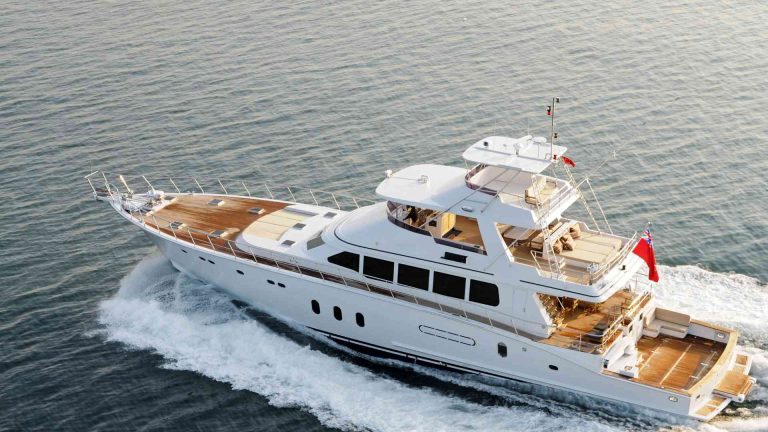
How Does Autopilot on a Yacht Work?
Navigating a yacht across vast, unpredictable waters requires precision, skill, and unwavering attention. Enter yacht autopilot, a technological marvel that has revolutionized the world of boating. It’s the invisible hand at the helm, offering sailors enhanced safety and convenience on their maritime journeys. In this article, we embark on a voyage into the world of…

How Far Can a Yacht Travel? Helpful Examples
Picture this: a majestic yacht glides gracefully through azure waters, the sun setting on the horizon, and the salty breeze carrying whispers of adventure. The yacht, a symbol of luxury and exploration, embarks on a journey that promises the thrill of the unknown and the allure of far-off destinations. Yachting, a symphony of elegance and…

How to Become a Stewardess on Yachts in 5 Steps: Guide
Picture yourself amidst sparkling turquoise waters, basking in the warm rays of the sun, and indulging in the luxurious lifestyle of the high seas. Working as a stewardess on yachts offers a unique and enchanting opportunity to turn this dream into reality. From sailing across idyllic destinations to serving the needs of esteemed guests, this…

Should You Risk Letting the Cruise Line Pick Your Room?

Head to Head: Norwegian vs Royal Caribbean

Don’t Miss These Grand Cayman Shore Excursions

Who Is Lost Leblanc?
- You Me and the RV
- Technomadia
- RV Odd Couple
- Nomadic Fanatic
- Less Junk More Journey
- Keep Your Daydream
- I'm Not Lost I'm RVing
- Getaway Couple
- Flipping Nomad

- Sailing Lifestyle
How to Live on a Super Yacht
Living on a super yacht is a dream come true for many people. The luxurious lifestyle, breathtaking views, and the freedom to sail across oceans and explore exotic destinations are why owning or chartering a super yacht is often the ultimate symbol of wealth and success.
However, living on these massive boats is not just about indulging in luxury and relaxation. The lifestyle requires careful planning, organization, and adaptability.
If you want to test the waters and live at sea on a super yacht, let’s see what it takes.
Let’s dive in and get started!
What Is a Super Yacht?
A super yacht is a luxury vessel, typically over 80 feet long, for pleasure cruising. Wealthy individuals or corporations usually privately own these vessels. They come with all the amenities and features one would expect from a high-end luxury resort.
Super yachts range from sleek and modern to classic and elegant. Construction of these units is to the highest standards of craftsmanship and engineering. They can accommodate various activities, including dining, entertainment, and water sports.
Crews for these vessels are often a team of professionals who provide personalized services to ensure guests have the most enjoyable and comfortable experience. Overall, they’re the ultimate expression of luxury and freedom, offering unparalleled comfort and convenience to those fortunate enough to own or charter one.

Can You Legally Live on a Super Yacht?
Living on a super yacht or any other boat is generally legal. However, the rules will vary depending on where you’re attempting to live. You must follow the local regulations, whether in a country, state, city, or marina.
If you’re thinking about living in international waters, it’s not very easy. International waters typically are 24 nautical miles from a country’s coastline. It’s crucial to note that international waters are not the wild west. Most travelers in these waters must follow the laws according to the country they’re sailing under.
HOT TIP Get good internet no matter where your super yacht sails to. Learn more about using Starlink on boats .
What to Think About When Living on a Super Yacht
Living on a super yacht is an exciting and luxurious lifestyle offering the ultimate comfort, relaxation, and adventure. However, it also comes with unique challenges and considerations to make the experience enjoyable and stress-free. Let’s look at several things you must consider before living on a super yacht.
Good Boat Insurance
One of the most crucial considerations when living on a super yacht is having adequate boat insurance . Super yachts are precious assets requiring specialized insurance coverage beyond what standard marine insurance policies typically provide.
Since your super yacht will be your floating home, you must acquire adequate coverage for your vessel. Coverage and premiums will vary depending on the vessel’s value, onboard equipment, and personal belongings.
It would be best to work with an experienced insurance provider when acquiring your insurance policy. This can help ensure you don’t have any surprises should you need to file a claim.
Living Expenses
Like living in a sticks-and-bricks home, you will have living expenses while on a super yacht. You must cover onboard amenities and supplies, docking and berthing fees, fuel, and crew salaries for those helping to manage and maintain it.
Captains, engineers, deckhands, attendants, chefs, and other employees will have salaries and benefits packages. These will be ongoing expenses that you’ll need to consider.
Yacht Maintenance
We hate to be the bearers of bad news, but even if you spend millions on your super yacht, things will break. You must do regular inspections, scheduled maintenance, and repairs promptly.
Unfortunately, things don’t always break when it’s convenient. So you will need a healthy stack of cash to replace parts and components when they unexpectedly break. If not, you could be stuck at the marina.
Unseen Weather Conditions
The weather conditions can be incredibly unpredictable. However, weather conditions at sea are more than worrying about how much rain or lightning you’ll experience. Severe weather can significantly impact water conditions. The weather can change quickly at sea, and you must constantly stay aware of the weather forecasts.
You must have an emergency plan and a staff trained in responding. A super yacht offers the flexibility to move when weather conditions may not cooperate. You may have to adjust your itinerary or plans, so that flexibility will be crucial in this lifestyle.
Yacht Registration
Just like you must register your vehicle, a super yacht will also require registration. Where you register your vessel will determine the taxes and fees associated with registering a yacht. Additionally, where you register your craft will also determine the legal requirements your vessel must meet.
You need to understand the legal requirements, taxes and fees, and other factors associated with yacht registration. This allows you to make informed decisions that meet your needs, preferences, and those of your staff or anyone onboard the yacht.
Safety and Security
When living on a super yacht, safety and security are critical items you must take seriously. While yachts typically come with many safety features and security systems, there are still potential risks and threats that you must address.
It is vital to take proactive steps to mitigate potential risks and threats. The vessel will need the appropriate safety and security systems, and the crew will need training in basic procedures and protocols to keep everyone, including the vessel, safe and secure.
Living In International Waters
International waters are outside of the jurisdiction of any specific country, and they present opportunities and challenges for those living on a super yacht. Understanding the legal requirements and regulatory authorities is essential to ensure you comply with laws and regulations.
Living in international waters will require a tremendous amount of self-sufficiency. Accessing supplies, services, and emergency assistance can be challenging. You’ll also need the proper navigation and equipment to communicate with other vessels and the appropriate authorities.
While Jack Sparrow may not be on the open seas, pirates exist. You cannot take your safety and security too seriously when staying safe on international waters. You’ll likely want to consider hiring security personnel and avoid cruising into high-risk areas.

What Are the Pros of Living on a Super Yacht?
There is a long list of pros to living on a super yacht. It’s one of the most luxurious lifestyles imaginable. The level of service that individuals receive onboard these vessels is unlike anything most people will ever experience.
Life on a super yacht provides much freedom and flexibility. You can travel practically anywhere and make the world your playground. You can create your schedule and choose where to set the sails daily.
The lifestyle can be incredibly relaxing and rewarding. You’ll experience new cultures, taste exciting foods, and meet people with equally exciting adventures. Who wouldn’t love that?
HOT TIP Just because you live on a super yacht doesn’t mean you won’t get mail! Find out How to Get Mail Sailing Around the World .
The Cons of Living on a Super Yacht
While there is much to love about living on a super yacht, it’s not perfect. The lifestyle is costly, and you must deal with limited space. Additionally, you have to manage the crew’s dynamics, which can be challenging. Unfortunately, you can’t force anyone to walk the plank if they cause a fuss amongst the staff.
Don’t forget that you could experience days of rough seas. This could result in experiencing seasickness. The vessel will constantly be floating on the water and can be challenging for those prone to seasickness.

Does Living on a Super Yacht Cost Less Than in a House?
Living on a super yacht is typically more expensive than living in a traditional house or apartment. Super yachts are costly to purchase or charter, and they also require ongoing maintenance, crew salaries, and other expenses that can add up quickly.
While it is possible to save money on specific expenses, like property taxes and mortgage payments, the overall cost of living on a super yacht is typically higher than living in a traditional home or apartment. There are often additional costs associated with living on a super yacht that may not be present in a conventional home, like higher fuel prices and the fees for maintaining and repairing complex systems and equipment.
How luxurious you expect your lifestyle will significantly determine whether it’s more or less expensive than a house. However, it’s crucial to remember that yachts are typically depreciating assets and require substantial maintenance to retain their value.
Is Living on a Super Yacht Worth It?
Living on a super yacht can be a fun and exciting way to live. However, it will take a pile of cash. The lifestyle can be incredibly unpredictable, dangerous, and expensive. Severe weather conditions at sea can threaten you, your vessels, and any crew or passengers on board. Before you sell your home and move into a boat, make sure you fully consider the entire lifestyle.
Would you live on a super yacht full-time?
If You Love RVing, You Need to Stay Informed
Don’t rely on biased RV industry news sources to keep you informed with RVing news.
Stick with Nomadic News. We publish daily articles and breaking stories that matter to your RV lifestyle.
Leave a Reply Cancel reply
Your email address will not be published. Required fields are marked *
Save my name, email, and website in this browser for the next time I comment.

5 Best Places to RV for Beginners

These are the 5 Best Road Trip Cars of 2023
Related posts.

Who Is SV Delos?

70+ Year Old Man Says Seniors Can Still Sail! Here Are His Top Tips!

- Content Creators
Who is Sailing Uma?

Can a Sailboater Sleep Anywhere in Open Water?

The global authority in superyachting
- NEWSLETTERS
- Yachts Home
- The Superyacht Directory
- Yacht Reports
- Brokerage News
- The largest yachts in the world
- The Register
- Yacht Advice
- Yacht Design
- 12m to 24m yachts
- Monaco Yacht Show
- Builder Directory
- Designer Directory
- Interior Design Directory
- Naval Architect Directory
- Yachts for sale home
- Motor yachts
- Sailing yachts
- Explorer yachts
- Classic yachts
- Sale Broker Directory
- Charter Home
- Yachts for Charter
- Charter Destinations
- Charter Broker Directory
- Destinations Home
- Mediterranean
- South Pacific
- Rest of the World
- Boat Life Home
- Owners' Experiences
- Conservation and Philanthropy
- Interiors Suppliers
- Owners' Club
- Captains' Club
- BOAT Showcase
- Boat Presents
- Events Home
- World Superyacht Awards
- Superyacht Design Festival
- Design and Innovation Awards
- Young Designer of the Year Award
- Artistry and Craft Awards
- Explorer Yachts Summit
- Ocean Talks
- The Ocean Awards
- BOAT Connect
- Between the bays
- Golf Invitational
- BOATPro Home
- Superyacht Insight
- Global Order Book
- Premium Content
- Product Features
- Testimonials
- Pricing Plan
- Tenders & Equipment

What's trending in superyacht technology?
Despite the omnipresence of today’s smartphones and gadgets, yachts have struggled to keep up with tech developments onshore. But that’s changing – and fast, as Risa Merl discovers the latest technology trends in the world of superyacht design.
When it comes to technology, we’ve never had it so good. From an ever-increasing range of gadgets and gizmos to the latest advances in connectivity, there’s more choice, and more exciting developments on the horizon than ever before – and that goes for the superyacht world, too. Owners want the same services – if not better – that they can access on land, and a handful of specialist firms are doing their best to meet consumer-driven demand on board. Yet, whether owners appreciate it or not, yachts have their own challenges when it comes to keeping up with tech’s constant progress. The middle of the ocean is one of the hardest – and most expensive – places to ensure fast and reliable broadband. And the three-year build time of a custom yacht is a challenge for suppliers and designers who need to think ahead and include the latest tech by the time the yacht is launched. Nonetheless, tech companies are rising to the challenge with an abundance of products to enhance onboard entertainment and security.
“Yacht guests want the same experience they have at home, so rock-solid and secure Wi-Fi is the first priority,” explains Videoworks CTO Maurizio Minossi, “and bigger internet pipes will be available within the next two years in order to allow 5G and new-generation VSAT [very small aperture terminal – a compact, two-way satellite antenna].” Super-fast connectivity is leading the charge, then, but there are plenty more developments in the pipeline too...
Streaming on superyachts
On-demand services such as Netflix and Amazon Prime have all heightened our expectations of how quickly we should get whatever we desire. We want it now, and that includes being able to watch the latest movies and television shows, wherever we are. Streaming services that work on land, however, haven’t always worked as efficiently on yachts, both in terms of reliable connectivity and price point, as Anil Thadani, owner of the world- roaming 45-metre Latitude reports. “The service I used before was horrible,” he says. “Connectivity was spotty, the speed was awful and it cost a lot more because they only gave us a limited amount – 30GB per month – for about $7,000 [£5,400], and if you exceeded that, the rates would be exorbitant.”
Thadani found a new service for Latitude that is working wonders. Switching over to Marine VSAT required a new satellite dome, which incurred upfront costs, but he says that the service has been so good that the initial pain was worth it. Now for a fixed cost of $5,000 per month he can stream Netflix in remote parts of Indonesia and watch CNN live on his iPad. He says the streaming isn’t always flawless, but overall it’s “good enough” and he hasn’t experienced any outages. For an extra $5,000 per month, Marine VSAT can guarantee flawless streaming and unlimited data. Meanwhile, London-based satellite communications company Inmarsat is set to launch seven new satellites into orbit by 2023, which will include extended 'always-on' coverage across the Arctic for those plotting a polar adventure.
For those who don’t want to rely on a data connection, Kaleidescape is also offering its new Marine Movie Service. Launched at the Monaco Yacht Show, it offers movie and music collections that arrive on a hard drive in a matter of days. One drive can hold up to 100 Blu-ray or 50 4K-quality movies, and customers (either a hands-on owner or a crew member) can have whichever titles they want pre-loaded on to it. The service also offers curated selections of new cinema releases, classic movies and kids’ favourites too.
It’s not the breadth of choice, however, but the quality of what’s on offer that companies are focusing on. “Ten years ago, yacht owners and captains were more concerned with how to get enough content,” says Cheena Srinivasan, founder and CEO of Kaleidescape. “Now there’s an overabundance of content, and we are trying to solve that problem through curation. Think of this as a white-glove concierge service. We’re bringing convenience via an end-to-end system through working with our marine integrators, so the yacht owners don’t have to worry about anything.”
Kaleidescape demonstrated its offerings during the boat show, dimming the lights on board the Tankoa yacht Solo and showing how vividly coloured and rich in sound a movie from its system is. Solo is beta-testing this brand new service, supported by 88 marine integrators worldwide who will install the hard drives to ensure quality control.
IT support at sea
Priva is another superyacht tech company that’s putting a focus on concierge services to reduce owner headaches – what good is expensive kit if it doesn’t work when you want to use it? Priva’s Technical Concierge is a 24/7 service that connects crew directly to expert audiovisual and technical support. Rather than getting passed around at a call centre, users will find that the first person to answer this hotline is a highly skilled technical expert, who will work with the captain or electronic technical officer to get the yacht’s tech back online and working right away.
“We want yacht owners to get the most out of every minute they spend on board,” says Cynthia Gillis, senior vice president at Global Eagle, the company behind Priva. “PRIVA and our 24/7 Technical Concierge service are tailored to our clients who want to be fully connected and access customized content from anywhere in the world. We have 50, high-touch, trained technicians and specialists dedicated to yacht customers who are available to address our clients’ specific technical needs without disrupting their onboard experience.”
Connectivity on demand
Of course, superyacht owners aren’t on board all the time, and charter yachts aren’t booked every week of the year, so onboard tech has to be scalable to suit their needs. “Flexibility is key when it comes to yacht connectivity,” says Peter Broadhurst, senior vice president at Inmarsat. Its latest generation of Global Xpress satellites were launched two years ago and allow for greater bandwidth. Inmarsat then tailored the service to the yachting industry with Fleet Xpress, which has since performed more than 10,000 installations.
The service allows owners and managers to scale bandwidth up and down, depending on usage and the number of people on board at any one time, and even allows clients to suspend their service in the off-season (or in case a worldwide pandemic leaves you on one side of the world and your yacht on the other). "We've introduced a lot more flexibility into our plans," Broadhurst explains, "the ability to upgrade and downgrade as and when you want, suspend the service, change the data rates and plans." Inmarsat data plans start from just three months.
Adaptability is also key when it comes to a yacht’s build. “One of the biggest challenges during any yacht project is that technology keeps evolving, and you don’t want a new yacht with old tech,” says Casper Kleiman of Dutch company VBH, which creates audio, video and IT products for new-build yachts as well as refits. VBH confirms that in the past systems needed to be connected physically, which added to the challenge of designing a yacht that needed to be up to date at launch three years down the line. But this is now changing thanks to software-based connections. “By using a flexible software-based backbone, it’s easier to connect new hardware later in the build,” Kleiman says. “We’ve used this on a recent 87-metre yacht.”
Once installed, technology also has to work within multipurpose spaces, which are becoming increasingly popular on board. A helideck might host yoga in the morning, a round of TopGolf in the afternoon and a live music performance, nightclub or movie under the stars come nightfall – and it still needs to be able to allow a helicopter to land if required. “Providing multifunctional areas and spaces that evolve throughout the day, including the main saloon and beach club, requires technology that can adapt from one experience or functionality to another,” says Alistair Levine, director of sales and marketing at California Audio Technology.
“This type of flexibility harnesses everything from video walls and audio systems to lighting control and motorised shades, so that you can manipulate the visual and auditory experience to suit your needs – but this level of functionality needs to be discussed at the design stage.”
Smartphone apps
In recent years we’ve become attached – some might argue addicted – to our smartphones, so it’s no surprise that we now want and expect them to control our onboard tech. As yacht automation streamlines into a “smart yacht” experience, clients and crew want to be able to control all the onboard systems from one easy-to-use location. Videoworks currently offers just this, integrating all of the yacht’s domotics and onboard systems into a single device. Instead of the popular Crestron remote control, owners might opt for a dedicated multi-service app that allows them to manage all of their systems from a smartphone. ItwModeX is an iOS app (a web version can be installed on Android) designed by Itworks exclusively for Videoworks, which can be customised with content and graphics to suit each yacht. “Multi-service apps can seamlessly integrate with the usual tools guests are familiar with, such as Kaleidescape,” says Minossi. “We use them in most of our projects.”
Yacht brokerage houses are also thinking more about mobile devices, as proven by the new Burgess app which allows users access to its services whether on or offline. “We want to allow our clients and potential customers access to Burgess yachts and content via whichever channel they prefer,” says Tim Davis, chief marketing officer at Burgess. “Our research shows that our target audience favours mobile devices [over laptops or desktop computers] to access our digital services. We have seen a good proportion of new prospects registering with Burgess via the app, as well as existing customers. Take-up has been encouraging – and we are planning an Android version.”
Cybersecurity
Superyachts can have all the latest kit, then. Yet while advances in audiovisual technology are impressive, having sufficient cybersecurity to keep onboard internet connections safe hasn’t become standard practice. “Research showed us that 64 per cent of superyachts rely on simple firewalls or crew-based solutions to protect against cyber risks – and 76 per cent don’t have anyone on board to look after cybersecurity,” says Rob Myers, senior director at Inmarsat. The company now offers its Fleet Secure End Point service to address this problem. It is designed to prevent cyberattacks, detect vulnerabilities and respond to threats – and the bandwidth used doesn’t come out of the yacht owner’s monthly allowance. "It's a pragmatic approach to security," says Broadhurst.
At the Marine Equipment Trade Show in Amsterdam, Videoworks introduced Cisco ASA 55066, a new dedicated onboard cybersecurity device. “Cisco ASA is a state-of-the-art cybersecurity product,” claims Minossi. The network security device incorporates threat- defence software, which allows for real-time identification and prevention of viruses and threats from the web. Several levels of security are permitted via a single platform, and it can also look at all network activity to see vulnerabilities in any apps or files, with an automated system assessing potential threats.
Emotional rooms
“The modern consumer is all about the experience that their technology delivers to them, not the underlying technology,” Levine says. “Millennials are starting to drive these conversations. Whether they are the children or grandchildren of the owners, they are far more willing to pay for exceptional experiences than things.” Meeting this demand is the rise of dynamic, interactive and so-called “emotional” tech on board, which is designed to enhance a guest’s experience.
Sacramento-based California Audio Technology creates “dynamic entertainment experiences”, and is looking to do more with less – including less equipment. The company is working on an audio specification that will allow onboard DJs or bands to be accompanied simply by their laptops or instruments without the need to bring on a bulky PA system, and the time and logistics that are required for set-up. Working with production company Blue International Talent, it is developing a marine system spec that will consider a yacht’s individual sound and lighting needs – however high-spec these might be.
“Most audio systems in the marine space are designed to deliver low-level background audio, yet most stadiums don’t have the aesthetic integration possible that a yacht requires,” says Levine. “This specification will allow for a whole new range of experiences for both charter guests and owners, by giving them the opportunity to have everything from a stand-up comedian to a jazz trio to someone like Coldplay, David Guetta or Elton John playing a private concert on the back of their yacht in a remote part of the world.”
Meanwhile, VBH is focusing on setting the mood, and helping to create ever more extravagant examples of interactive bars, walls and hallways that can transform a superyacht space using content displayed on screens. “Instead of such screens only being used for showing movies or television shows, we can use them as integrative backgrounds,” says Kleiman. “They can add extra depth and meaning to a boat’s space.”
Perhaps as a much-needed salve to all this overload in technology, Videoworks has developed what it calls the Emotional Room, a system that utilises an algorithm on a neural network to assess the mood of the people in a space and adapt the lighting and music accordingly. Cameras in the room will scan guests’ faces to determine their emotions by mapping “points of interest” on their faces, such as the eyes, lips and cheekbones. The neural network will then learn how different settings – from lighting set-up and positions to music selection – in the room affect human emotions. This self-learning system evolves the more it’s used, and is designed to replicate conditions that it logs as the most pleasing.
Emotional Rooms will start appearing on yachts from late spring this year, including in a project with one of the top Italian builders. Not only is superyacht technology getting better at giving us what we want, it will soon be doing it without us even asking.
Safety first
With such enormous pieces of machinery sitting far from land, there's a certain risk factor that comes with the territory of yachting. And while the owner is busy soaking up the sunshine or entertaining guests of an evening, it's the role of the crew and captain to ensure safety at all times. "Don't run on the decks" springs to mind, but in reality, onboard safety goes far beyond the do's and don't of yachting etiquette. Inmarsat is currently trialling an IMO approved safety solution 'Fleet Safety', set for release later this year. "We've effectively brought safety communications into the 21st century," says Broadhurst. "If the vessel is in any danger then the crew have immediate access to secure communications. It's easier to use than what's currently out there, with greater functionality that will allow the crewmembers to feel confident in onboard safety equipment and communications. Inmarsat was set up to provide safety to seafarers and this is effectively the next generation of safety."
This feature is taken from the March 2019 issue of BOAT International. Get this magazine sent straight to your door, or subscribe and never miss an issue.
More stories
Most recent, from our partners, sponsored listings.
- Search Please fill out this field.
- Manage Your Subscription
- Give a Gift Subscription
- Newsletters
- Sweepstakes
:max_bytes(150000):strip_icc():format(webp)/rebecca-cheptegei-budapest-082623-4820-edca1d5e0b2a4ae99b1f2f85a770dbbc.jpg)
- Human Interest
- Real People
- Real People Tragedy
Some of the Sicily Yacht Sinking Victims May Have Suffocated After Air Pocket Ran Out, More Testing Needed: Sources
Seven people were killed when the luxury vessel, carrying 12 passengers and 10 crew, sank amid severe weather off the coast of Sicily last month
:max_bytes(150000):strip_icc():format(webp)/Profilephoto-7006bfc2c85543c3a3686dd1afbaf28a.jpg)
More testing will be needed to determine how some victims died in the Sicily yacht sinking last month , a source tells PEOPLE.
Preliminary autopsy results on Chairman of Morgan Stanley International Jonathan Bloomer and his wife, Judy Bloomer , “show they died from suffocation,” says the source, who is close to the investigation of the sinking.
However, tests on their tissues are now underway to definitively determine whether or not the couple died of suffocation because an air bubble in the yacht cabin they were in ran out of oxygen and filled with carbon dioxide, the source says, or if breathing in water was the cause.
Sources tell PEOPLE the tests could take as long as a few weeks to be carried out and for the results to be released.
The Bloomers were among seven people who died when the luxury yacht Bayesian sank off the coast of Porticello early on Aug. 19 amid severe weather, officials have said.
Twenty-two people were onboard — 12 passengers and 10 crew — and the seven victims included the Bloomers; New York City-based lawyer Christopher Morvillo and his wife , jewelry designer Neda Morvillo; British tech businessman Mike Lynch and his daughter Hannah ; and the yacht’s chef, Recaldo Thomas .
Family Handout/PA Wire
Autopsies for the Lynches and Thomas will be conducted on Friday, the source close to the investigation confirms to PEOPLE.
On Monday, Sept. 2, the Associated Press and Italian news agency ANSA reported that the autopsies of Christopher and Neda Morvillo ruled their cause of death as drowning.
In the days since, however, some uncertainty has been raised about exactly how the six victims suffocated in their cabins. (The seventh victim, Thomas, the chef, was found outside the Bayesian .)
Never miss a story — sign up for PEOPLE's free daily newsletter to stay up-to-date on the best of what PEOPLE has to offer, from celebrity news to compelling human interest stories.
CNN and the La Repubblica newspaper reported that the initial autopsies done on the four victims so far indicated they were killed by “atypical drowning” and, according to La Repubblica, the Bloomers and the Morvillos “had no water in their lungs, trachea, or stomach.”
Reuters reported that the initial autopsies of the four victims so far "indicated they had died of suffocation as oxygen ran out on the stricken vessel" but "[m]ore forensic tests were ordered."
Sources caution to PEOPLE that this examination and testing will need to be done before it is confirmed how those victims suffocated.
Other causes of death have been ruled out.
Medical experts say that in some cases of drowning, water doesn't enter the lungs because of an involuntary reflex in the throat, leading to suffocation.
So-called "dry drowning" is not a medically preferred term as water is always a factor in these cases.
PERINI NAVI PRESS OFFICE/HANDOUT/EPA-EFE/Shutterstock
Girolamo Bentivoglio Fiandra, head of the Palermo Fire Brigade, spoke at a news conference last month as the yacht victims were formally identified and shared details of their final moments and where they were recovered.
“It was quite clear that people [inside] were trying to hide in the cabins. In the left-hand side, we found the first five bodies in the left-hand side cabins, and the final body on the right-hand side. We found them on the highest part of the ship which was closer to the surface. The vessel had three cabins on each side,” Fiandra said then.
He also said that the five who "took refuge in the cabins on the left side of the sailboat" had been "searching for air pockets."
A broader investigation is ongoing into how, exactly, the Bayesian sank in August — in what some witnesses have said was a quickly unfolding tragedy that has puzzled observers, given the yacht’s size and apparent capability to withstand bad weather.
Related Articles

Review of the Sailing Yacht Contest 55
Family Vacation on a Yacht
Family yacht tour, people's favorite, what kind of entertainment is available on a yacht, what to see in belgrade.

Editor's Picks
Trending articles, what medicines to take on a trip, great blue hole (belize), dubai marina: a modern and elite area of dubai, yacht charter in the uae.
The Contest 55 model, with a length of 17 meters, occupies a middle position in…
Subscribe to Updates
Get the latest creative news from FooBar about art, design and business.
By signing up, you agree to the our terms and our Privacy Policy agreement.
Popular Now
Top 10 nude beaches in greece and athens, all you need to know about regattas: types, classifications, and handicaps, which caribbean islands are the best, yacht financing: overview of financing schemes in europe, yacht food: tips and tricks for planning your meals on board.

Featured Reviews
The Contest 55 model, with a length of 17 meters, occupies a middle position in the Dutch…
Latest Articles
The Contest 55 model, with a length of 17 meters, occupies a middle position in the Dutch shipyard’s model range. During testing…
Looking for a new perspective on family vacations? Try a family vacation on a yacht! It’s a fantastic opportunity to spend quality…
A family yacht tour is an excellent option for those who want to experience a unique vacation with their loved ones. It’s…
Belgrade is a city full of hospitable and cheerful Serbs who are skilled in cooking delicious meat, smoking, and brewing strong coffee…
A first aid kit is just as important for any trip as a passport, travel insurance, and money. It can save your…
Among the waters of the Caribbean Sea, there is a small semi-submerged coral island of an unusual shape. On this atoll is…
Dubai Marina is a relatively new, elite area of Dubai located around an artificial lagoon. The lagoon, known as Dubai Marina, is…
We're Social
Yachting zone.
Type above and press Enter to search. Press Esc to cancel.

Creating sea change in the superyacht industry

Matchmaking yachts with good causes

Meet the superyacht owner who designs yacht interiors for a living
The Superyacht Life Foundation champions the positive people, places and projects surrounding the superyachting good life.
Latest stories.

Electric flying foilers
With speed, long range and unprecedented fuel efficiency, will electric hydrofoiling tenders become the new favourite among superyacht owners?

Fuel cell technology for a more sustainable future
Massimo Perotti on the motivation and innovation behind Sanlorenzo’s new 50Steel yacht.

From trawler to explorer
Meet the hands-on owner who decided to do things differently and converted a North Sea fishing trawler into an explorer yacht.

Exploring Indonesia’s 17,000 islands one month at a time
Noelle Bonnemaison on her annual voyage of adventure and discovery aboard her beautiful phinisi, Ocean Pure 1.
#humansofyachting

The yacht captain who doubles as a musician on life at sea and the joy of serenading his guests.

Tech entrepreneur and former chief engineer, Aaron Fidler, swapped crew life for superyacht ownership with his striking boat – AK Royalty.

The Master Furniture Maker has turned her hand to the superyacht industry, building sustainable pieces using wood offcuts. Here, she tells her story.

From life in a rural German village to the superyacht life Down Under, Nick Paul shares his unlikely journey to becoming a superyacht captain.

Behind every superyacht lies a story. The Superyacht Life Foundation is on a mission to share these stories, offering a fresh take on the positive people, places and projects that surround the superyachting good life. This is superyachting that shares your values.
Do you work in the superyacht industry? Yes No I would like to receive updates from Superyacht Life
Don’t miss out
Sign up to our newsletter and get our latest stories delivered monthly to your inbox.
.css-2lanc1{line-height:64px;max-width:500px;text-align:center;} The Perfect Yacht for Any Occasion
Thousands of yachts for charter and purchase around the world.
Featured in

Featured Yachts for Charter in
Here's what our clients have been saying.
Cannot say enough good things about my clients experiences with Anthony and the YachtLife team. His boats and crew are...

AmEx Centurion Travel and Leisure
Our time on the 42' Wider yacht exceeded our expectations. The boat's crew of Ophelia and Ben were an absolute pleasure...

Chartered in Nice, South of France
We just finished our charter in Mallorca. Day has been a 10. Boat is amazing and the captain is fantastic. Best day of our...

I’ve chartered yachts in the US, Bahamas and Virgin Islands, and the service is always excellent. It’s been an...

Featured Locations for Charter

Ibiza, Spain

Nassau, Bahamas

Mykonos, Greece

Los Cabos, Mexico

South of France

Cancun, Mexico

Amalfi Coast, Italy

British Virgin Islands

US Virgin Islands

Featured Yachts for Purchase
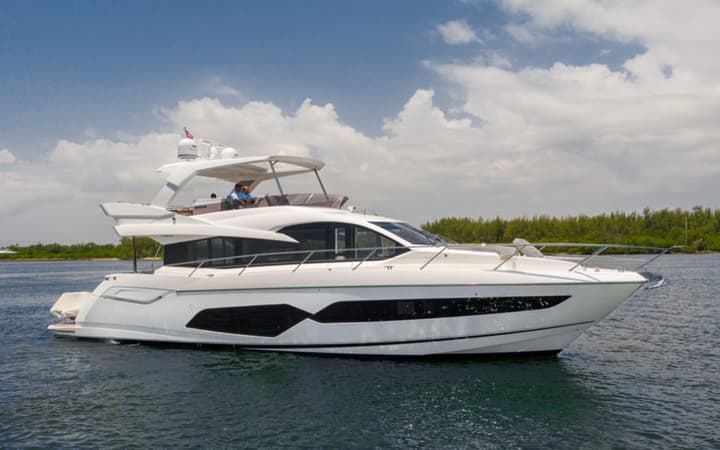
66' Sunseeker
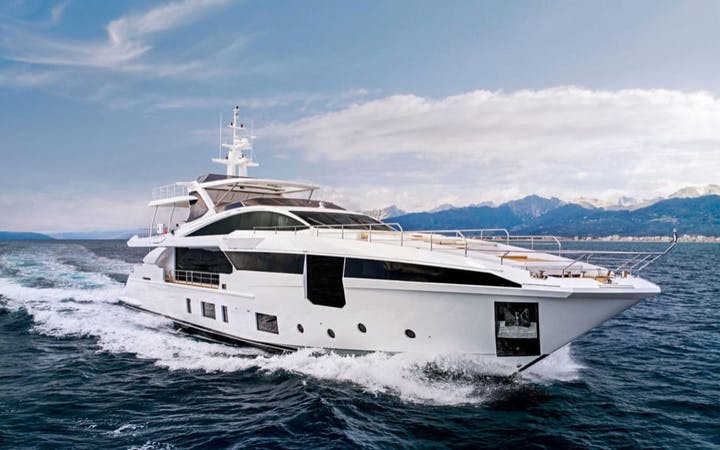
115' Azimut
$13,152,170
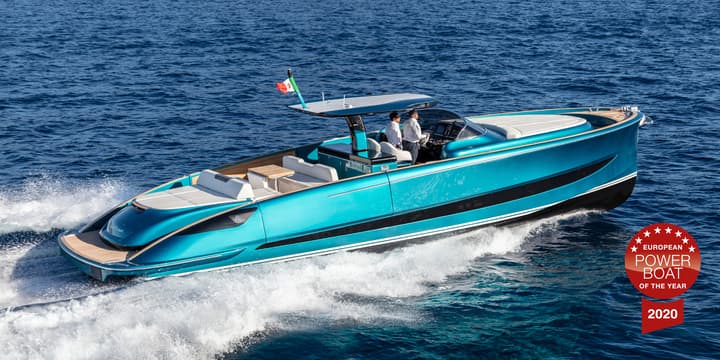
48' Solaris Power
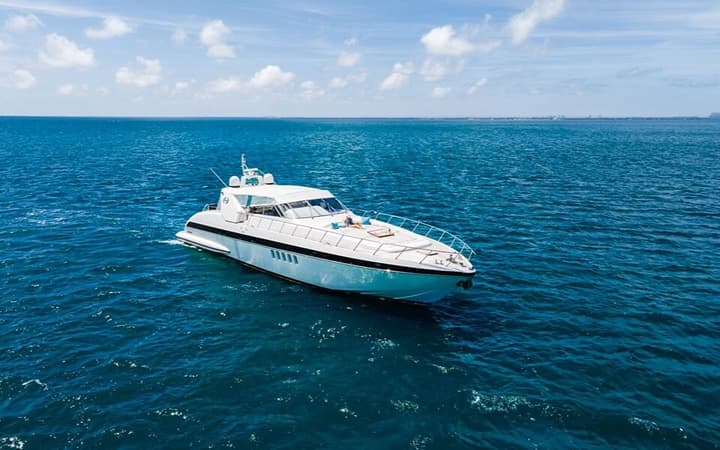
80' Mangusta
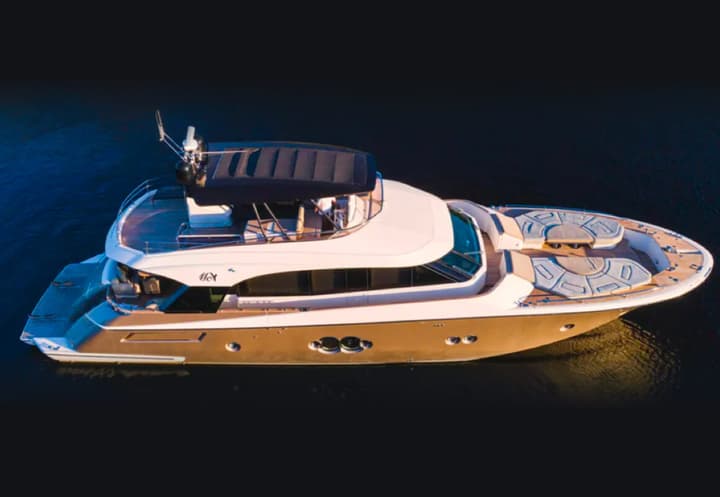
76' Monte Carlo Yachts
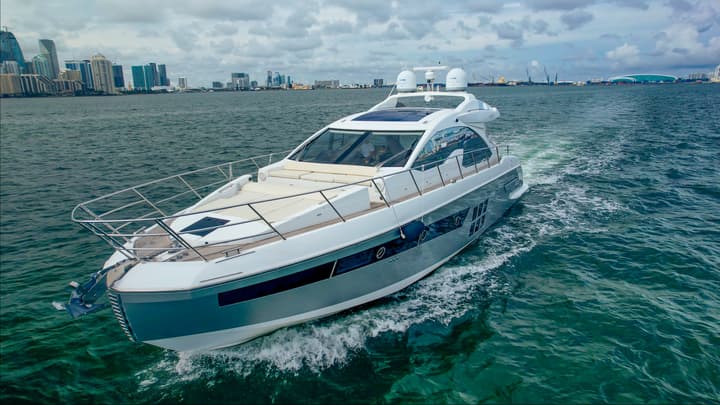
55' Azimut S
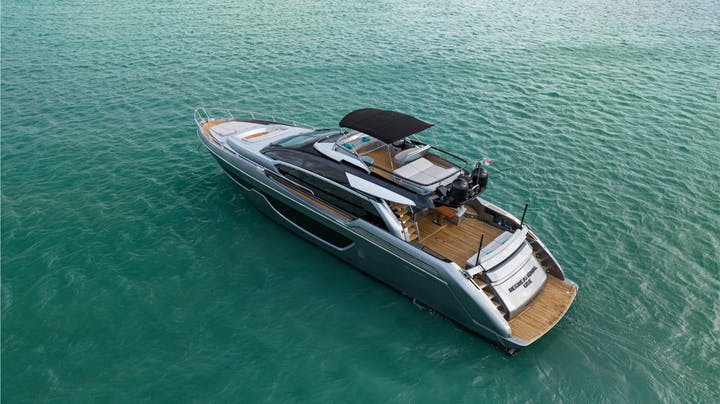
76' Riva
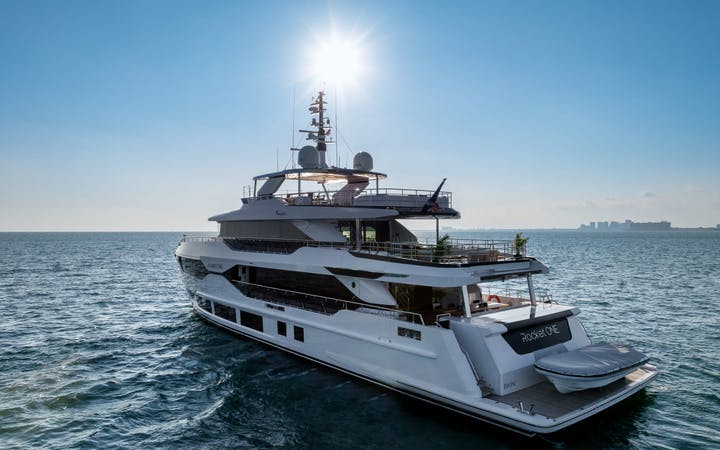
120' Majesty
$16,950,000
Get more information and connect with our specialists
To stay up to date on the latest additions to our fleet and other announcements.
Email Address
0, text: error()">
0, text: error(), css: errorCssClass">
Reset your password
Enter your email address or username and we’ll send you a link to reset your password
Check your inbox
An email with a link to reset your password was sent to the email address associated with your account
Provide email
Please enter your email to complete registration
Activate to continue
Your account isn't active yet. We've emailed you an activation link. Please check your inbox and click the link to activate your account
0, text: error" style="display: none;">
0, text: success" style="display: none;">
- Relationships
The Bored Panda iOS app is live! Fight boredom with iPhones and iPads here .
- Partnership
- Success stories
- --> -->